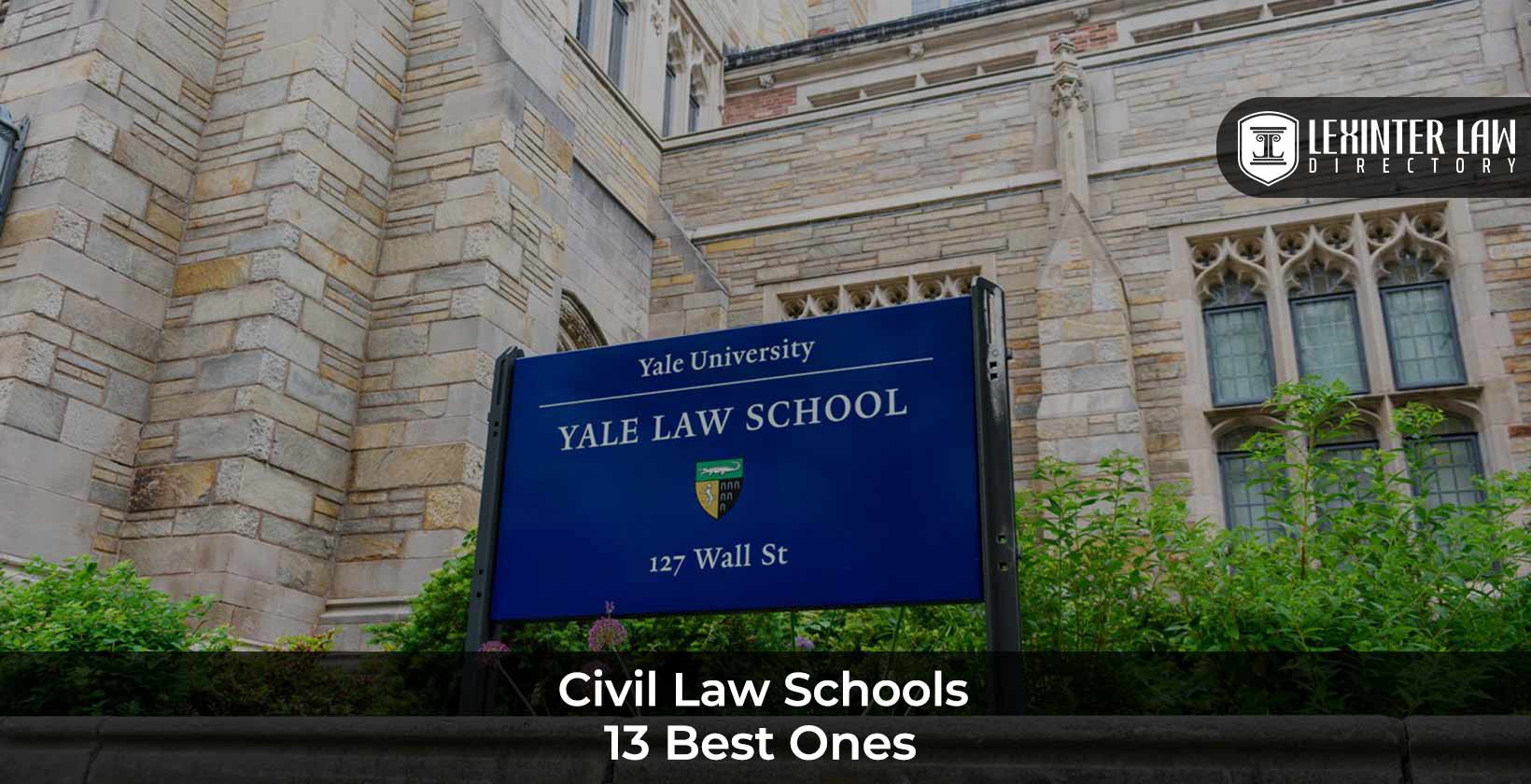13 Best Civil Law Schools
There are 13 institutions that consistently stand out for their academic excellence and practical training among the best civil law schools.
Yale Law School consistently ranks at the top for having a distinguished faculty and offering a comprehensive curriculum. Harvard Law School, globally renowned for producing influential leaders in law and politics, stands out as one of the top civil law schools. Stanford Law School, another major name, is highly regarded for having an innovative approach to legal education and placing a strong emphasis on practical skills. Columbia Law School and New York University (NYU) School of Law offer extensive programs in civil litigation and dispute resolution, situated in New York, a legal hub. Other schools, like Duke Law School and the University of Michigan Law School, boast specialized programs in civil law and impressive faculty-to-student ratios, ensuring a more personalized legal education. The University of Texas Law School, located in Austin, offers one of the most comprehensive civil law curricula in the South. Each offers unique programs tailored to students aiming for successful careers in civil law. The schools offer exceptional academic programs and open doors to prestigious internships and clerkships. Graduates from the top civil law institutions are well-prepared to excel in local and international civil law settings.
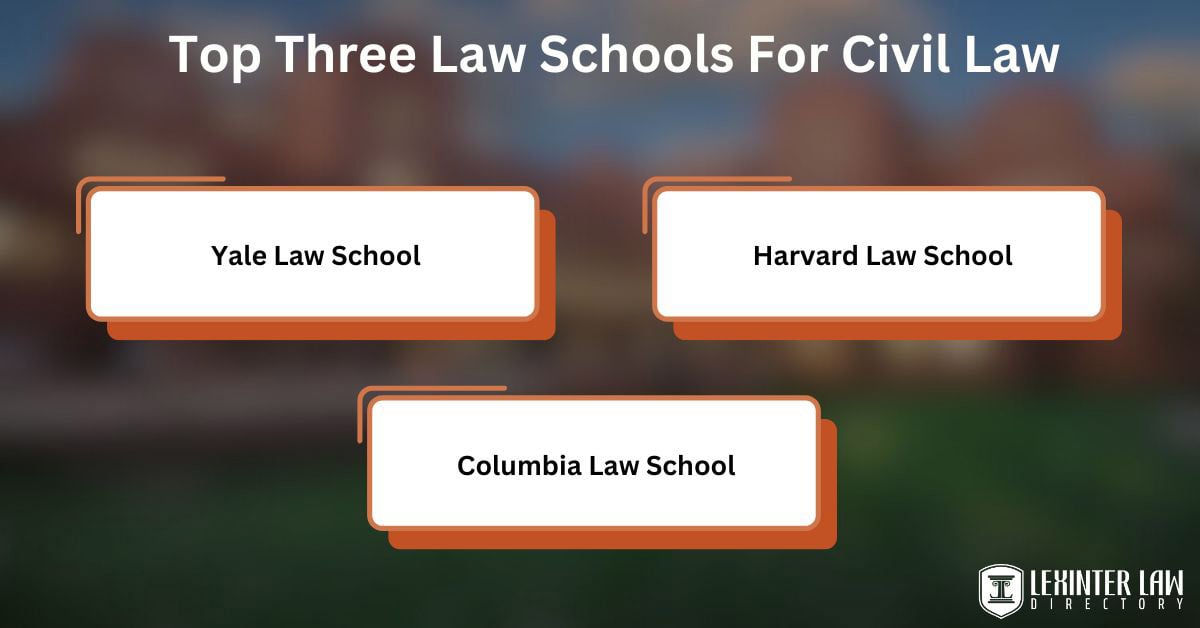
The top three law schools for civil law are listed below.
- Yale Law School: Yale Law School, established in 1824, ranks as the top U.S. law school, offering rigorous civil law programs. The law school provides degrees like the J.D., LL.M., J.S.D., and Ph.D., tailored to students’ academic and professional goals. Students gain practical experience through clinics such as the Ludwig Center and Jerome N. Frank LSO. Yale’s acceptance rate is 5%, with annual costs around $100,469. Financial aid averages $32,852, and 63% of students receive scholarships. Graduates enjoy a 95.41% employment rate across diverse legal fields.
- Harvard Law School: Harvard Law School, founded in 1817, is a leading institution for civil law education. The law school offers J.D., LL.M., and S.J.D. degrees, preparing students for legal practice and academic careers. Harvard Law is highly selective, with a 9.58% acceptance rate. Tuition for 2024-2025 is $78,692, with 42.55% of students receiving financial aid. Students gain hands-on experience through clinics like the Legal Services Center and Harvard Legal Aid Bureau. Graduates enjoy a 96.3% employment rate, securing roles across diverse legal fields.
- Columbia Law School: Columbia Law School, established in 1858, is renowned for its civil law programs and global prestige. The law school, located in New York City, offers degrees like J.D., LL.M., and J.S.D., preparing students for specialized legal careers. Columbia’s acceptance rate is 12.23%, with tuition for 2024-2025 set at $81,292, plus $32,419 in living expenses. The school excels in international civil law, focusing on arbitration and litigation. Students gain hands-on experience through clinics and extensive networking opportunities. Graduates secure top positions at prestigious law firms worldwide.
Table of Contents
- 1. Yale Law School
- 2. Harvard Law School
- 3. Columbia Law School
- 4. New York University School Of Law
- 5. University Of Pennsylvania Law School
- 6. Stanford Law School
- 7. University Of Chicago Law School
- 8. Duke Law School
- 9. University Of Michigan Law School
- 10. University Of Texas Law School
- 11. George Washington University Law School
- 12. Loyola Law School (Los Angeles)
- 13. University Of Virginia School Of Law
- How To Choose The Best Law School For Civil Law?
- What Is The Best Degree For Civil Law?
- How To Become A Civil Lawyer?
- How Long Would It Take To Study Civil Law?
- What Is The Average LSAT For Civil Law?
- What Can You Expect From A Career As A Civil Lawyer?
- What Is The Difference Between A Civil Lawyer And A Criminal Lawyer?
- How Do Civil Lawyers Earn?
- Where Do Most Civil Lawyers Work?
- How Can I Find Good Civil Lawyers Near Me With Lexinter?
1. Yale Law School
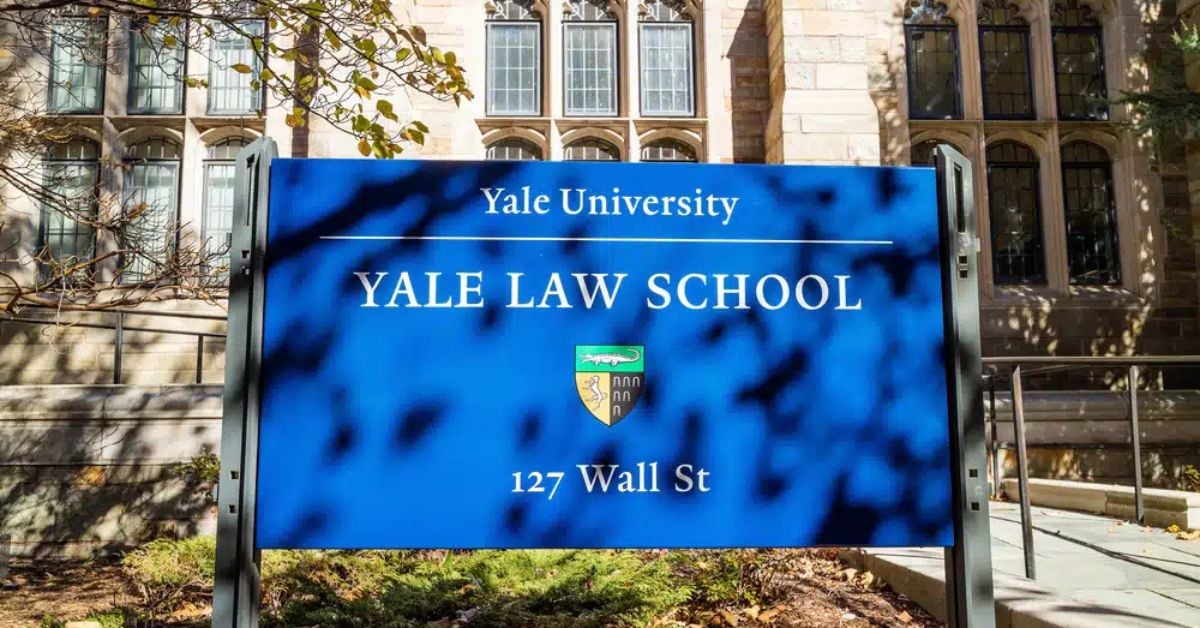
Yale Law School stands among the best institutions for studying civil law. The school’s rigorous curriculum equips students with a deep understanding of civil law’s complexities. Yale Law, established in 1824, is situated in New Haven, Connecticut. The school fosters an environment of collaboration and intellectual growth, preparing students for impactful legal careers across a wide range of fields. Yale Law School offers several specialized law degrees. The Juris Doctor (J.D.) is the primary law degree for students pursuing legal practice. The Master of Laws (LL.M.) program focuses on preparing students for academic careers and does not follow a prescribed curriculum, allowing for customized study paths. The Doctor of the Science of Law (J.S.D.) is a selective doctoral degree, open only to LL.M. graduates aiming for scholarly roles. The Ph.D. in Law is designed for lawyers pursuing careers in legal academia.
Yale Law School’s acceptance rate stands at approximately 5%, making the institution highly competitive. The tuition fee for the 2024-2025 academic year is set at $76,369. Estimated living expenses reach $24,100, pushing the total cost to $100,469 annually. 63% of enrolled students benefit from grants or scholarships. The average financial aid award is $32,852, which significantly lowers the overall cost for many. Yale remains the most selective law school in the country, emphasizing academic excellence. Financial support plays a key role in making the institution more accessible to diverse students. Yale Law School ranks #1 among the Best Law Schools (tie), known for academic rigor and competitive programs. The rankings reflect the depth of expertise and educational opportunities provided across diverse legal fields. The institution’s strong alumni network and influence in shaping legal thought further solidify its place among Connecticut Best Law Schools.
Yale Law School offers specialized programs in civil law that emphasize hands-on legal experience. The Ludwig Center for Community and Economic Development allows students to work on real-world civil cases. Students engage in civil law matters related to healthcare through the Solomon Center for Health Law and Policy. The clinical programs provide opportunities for direct client representation in civil litigation cases. The programs focus on developing practical skills in areas like community development, making them stand out from others. Notable faculty at Yale Law School shape the landscape of civil law. John Fabian Witt, the Allen H. Duffy Class of 1960 Professor of Law, focuses on American legal history and torts, demonstrating expertise through his award-winning book, Lincoln’s Code. Bruce Ackerman, a Sterling Professor of Law and Political Science, examines civil rights law, contributing valuable insights into constitutional and comparative civil law. The professors enrich the academic environment and foster critical thinking among students pursuing civil law studies.
Yale Law School offers extensive clinical opportunities in civil law, allowing students to work on real cases and gain practical experience. A prominent example is the Jerome N. Frank Legal Services Organization (LSO), which houses several civil law-related clinics. The Housing Clinic focuses on legal issues such as mortgage foreclosures, evictions, and fair housing disputes. The Ludwig Center for Community & Economic Development (CED) offers legal services to support affordable housing development and community economic projects. The clinics allow students to develop skills in litigation, negotiation, and policy advocacy under the supervision of experienced faculty members. Yale Law School offers robust networking opportunities in civil law through various platforms, connecting students with a vast alumni network. The Courtyard serves as an essential online tool, enabling students to search and connect with alumni by expertise, employer, and location. Alumni, numbering over 13,000 globally, offer valuable career insights and mentorship. Notable alumni in civil law include Clifford Alexander Jr., who served as the former Secretary of the Army, and Carla Anderson Hills, a former Secretary of Housing and Urban Development.
Yale Law School offers a diverse range of civil law courses that combine theoretical study with practical experience. Key offerings include Conflict of Laws, Constitutional and Civil Rights Impact Litigation, and the Housing Clinic, where students engage in real-world legal issues. Courses like Community and Economic Development and the Environmental Justice Law and Advocacy Clinic focus on public interest work, affordable housing, and environmental justice. Students gain hands-on experience through clinics, preparing them for impactful careers in civil law. Yale Law School’s Class of 2023 achieved a 95.41% employment rate, with graduates securing positions across various fields, including civil law, academia, and public interest. A significant portion of graduates began their careers in New York, Washington, D.C., and California, demonstrating the school’s national reach.
2. Harvard Law School

Harvard Law School stands as one of the top institutions for civil law, providing students with an exceptional foundation in the critical area of legal study. The law school began shaping legal minds in 1817 and continues to lead in innovation and thought leadership. Harvard Law, situated in Cambridge, Massachusetts, offers a vast range of programs and resources. Harvard Law School offers three primary law degrees: the Juris Doctor (J.D.), the Master of Laws (LL.M.), and the Doctor of Juridical Science (S.J.D.). The J.D. program is the most common and prepares students for legal practice. The LL.M. is a one-year advanced degree for students who have completed their first law degree abroad or in the U.S. The S.J.D. is the most advanced law degree at Harvard, designed for lawyers pursuing academic careers in legal scholarship and teaching.
Harvard Law School has an acceptance rate of 9.58%, reflecting its highly selective nature. The school received over 8,300 applications, but fewer than 800 were admitted. The tuition for the 2024-2025 academic year stands at $78,692, representing a 4.91% increase from the previous year. 42.55% of full-time students receive grants or scholarships, averaging $31,240 per recipient, significantly aiding tuition costs. Harvard University Law School ranks No. 4 (tie) among 196 law schools. The law school is renowned for academic excellence and rigorous programs. Faculty members, vast resources, and an extensive alumni network contribute to the school’s strong reputation in the legal field.
Harvard Law School offers specialized programs in civil law that focus on several key areas of legal procedure and dispute resolution. The Advanced Topics in Civil Procedure program delves deeply into procedural aspects, covering jurisdictional issues, claims inclusion, and fact-finding in civil litigation. Another unique offering is the Program on Negotiation, which focuses on negotiation techniques and dispute resolution. Harvard Law’s civil law programs are known for theoretical and practical approaches to complex legal processes. Harvard Law School boasts a robust faculty with deep expertise in civil law, offering courses and research opportunities that address various aspects of the legal field. Professors like Martha Minow and Richard H. Fallon, Jr. are among the notable faculty members who have made significant contributions to civil procedure and related areas. Harvard’s civil law faculty focuses on civil rights, litigation processes, and legal remedies, providing specialized courses such as Advanced Civil Procedure and seminars on complex litigation. The faculty’s work extends to advising on current legal reforms and advancing scholarship in procedural justice.
Harvard Law School offers extensive clinical opportunities in civil law, giving students hands-on experience in various legal areas. The Legal Services Center allows students to work on cases in civil litigation, housing law, consumer protection, family law, and veterans’ benefits, providing crucial legal support to low-income clients. The Harvard Legal Aid Bureau (HLAB) offers students the chance to represent clients in housing, wage, and family law disputes. Clinics like the Housing Law Clinic and Consumer Protection Clinic involve students in trial preparation, courtroom litigation, and advocacy for systemic reforms. The clinics provide essential real-world experience and serve underrepresented communities, making them key to legal education and community service at Harvard. Harvard Law School’s alumni network, with 40,000 members worldwide, provides significant networking opportunities through the Harvard Law School Association. Shared Interest Groups and regional clubs connect alumni based on professional interests, promoting mentorship, collaboration, and career development. Students and graduates focused on civil law build strong relationships and stay engaged with the legal community. Notable alumni in civil law include Elizabeth Warren, Charles Ogletree, and Annette Gordon-Reed, who have made lasting contributions to civil rights, legal practice, and academia.
Harvard Law School offers civil law courses covering key aspects of litigation and legal procedure. Advanced Topics in Civil Procedure explores complex procedural issues in modern civil litigation. Civil Procedure 4 focuses on the foundational rules governing civil litigation processes and practices. The Access to Justice Lab provides practical insights into the workings of civil justice systems. Clinical courses like the Harvard Legal Aid Bureau offer hands-on experience in housing and family law. Harvard Law School graduates secure impressive roles, including civil law positions at prestigious firms, government offices, and public interest organizations. 96.3% of the Class of 2023 achieved full-time employment within ten months, with 90.2% securing long-term legal careers.
3. Columbia Law School
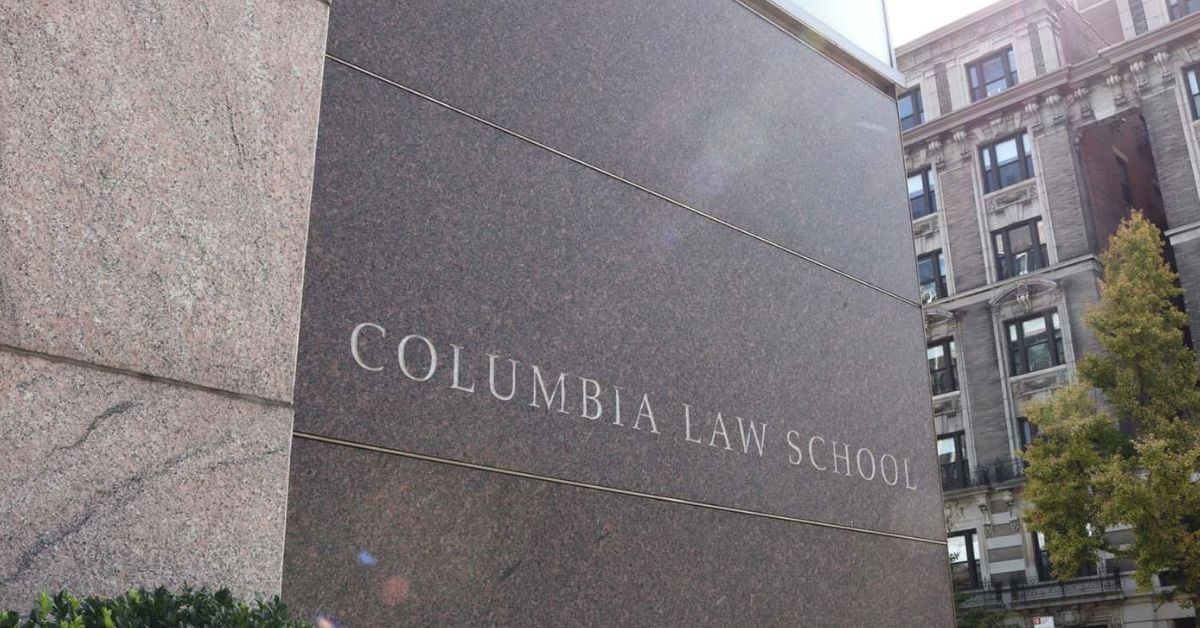
Columbia Law School stands as a leading institution for students pursuing civil law, consistently recognized for its strength in the area. Columbia Law, one of the most prestigious law schools globally, was established in 1858 and is located in New York City. The school offers students access to a dynamic legal market and unparalleled opportunities for professional growth. Columbia Law School offers advanced legal degrees designed for specialized careers. The Juris Doctor (J.D.) is a three-year program providing a broad legal foundation for U.S. legal practice. The Master of Laws (LL.M.) is a one-year program for lawyers seeking U.S. specialization. The Executive LL.M. in Global Business Law caters to professionals, blending online and in-person learning. The Doctor of the Science of Law (J.S.D.) focuses on legal research, preparing graduates for academic careers. The programs cover areas like litigation, national security, and social justice.
Columbia Law School had a highly competitive acceptance rate of 12.23% for the 2023-2024 academic year. Nine hundred forty-eight were admitted out of 7,754 applicants, and 363 enrolled, producing a yield rate of 38.3%. Tuition for the 2024-2025 academic year stands at $81,292, with additional living expenses estimated at $32,419. The student expects an overall annual cost of around $113,711. The costs include room, board, and personal expenses, making Columbia one of the most expensive law schools in the U.S. Columbia University Law School holds the No. 8 spot out of 196 law schools. The law school is reputed for producing influential legal professionals and leaders. Notable faculty, diverse opportunities, and strong ties to New York’s legal community enhance the school’s prestige. The institution, recognized as one of New York Best Law Schools, offers students unparalleled access to major law firms and judicial clerkships.
The programs at Columbia Law School focus on international civil law, particularly in international commercial law and arbitration, which are key areas within civil law systems. The International Commercial Arbitration program deals with resolving private disputes between parties, emphasizing procedures like arbitral processes, evidence handling, and enforcing awards. International Investment Arbitration addresses civil law matters involving investor-state disputes, centering on claims between private investors and governments under treaties like ICSID. The Vienna Arbitration Moot Court allows students to practice civil law principles related to international contracts, focusing on the United Nations Convention on Contracts for the International Sale of Goods (CISG).
Columbia Law School boasts a renowned faculty that specializes in civil law and provides deep expertise in litigation and dispute resolution. Kellen R. Funk focuses on the history of civil litigation practices and the transformation of American civil procedure, particularly the 19th-century reforms such as the Field Code. George A. Bermann plays a pivotal role in international arbitration, contributing to the Restatement of U.S. Law of International Arbitration. Columbia’s faculty offers students comprehensive training in civil law through research and practical insights. Columbia Law School offers a variety of clinical opportunities in civil law through its robust Experiential Learning Program. Students participate in clinics such as the Mediation Clinic, Family Defense Clinic, and Immigrants’ Rights Clinic, which provide hands-on legal experience in civil litigation and dispute resolution. The clinics allow students to work with real clients under close supervision, helping them develop practical skills in civil law contexts such as advocacy, litigation, and mediation.
Columbia Law School offers extensive networking opportunities for students and alumni, especially students pursuing civil law. Columbia LawLink serves as a vital platform for connecting with alumni, seeking career guidance, and building professional relationships within the legal field. Lions of Law, a celebrated initiative, highlights alumni achievements in civil litigation, public interest law, and human rights advocacy. Judge Arun Subramanian and Ellen Futter are among the notable alumni making significant contributions to civil rights and leadership in cultural institutions. The resources provide invaluable career development pathways.
Columbia Law School offers a range of civil law courses covering foundational and specialized topics. Civil Procedure introduces litigation elements, including jurisdiction, pleadings, motions, and remedies like punitive damages. Torts focuses on non-contractual wrongs, including negligence, malpractice, and strict liability in various contexts. Upper-year electives include Transnational Litigation, examining cross-border disputes and Law and Contemporary Society, and analyzing legal rules and societal changes. The courses prepare students comprehensively for careers involving litigation, regulation, and civil dispute resolution in various fields.
Columbia Law School graduates, including lawyers pursuing civil law, achieve impressive employment outcomes. A significant 83% of employed alumni secure positions at top law firms with over 500 attorneys.
4. New York University School Of Law
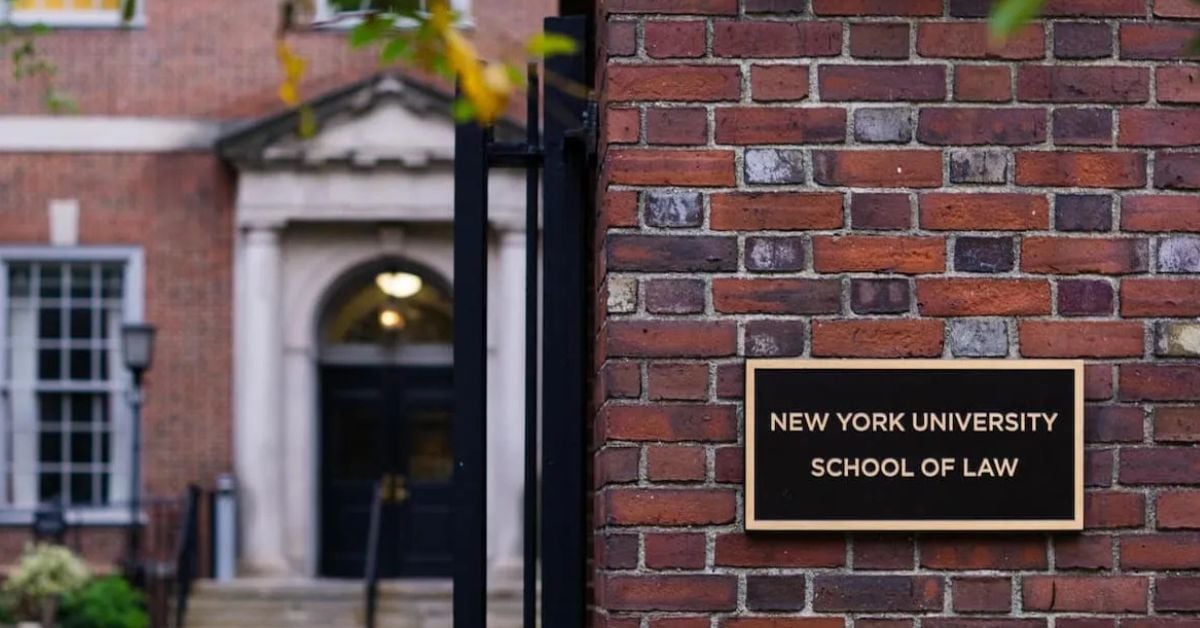
New York University School of Law excels in the study of civil law, consistently ranking as one of the best institutions in the field. The institution, established in 1835, is one of the oldest law schools in the United States and is located in New York City. The school offers a diverse and innovative curriculum, blending legal theory with practical experience.
New York University School of Law provides a variety of programs tailored to meet the needs of future legal professionals. The Juris Doctor is the primary degree, with options for joint degrees like the J.D./M.B.A. and J.D./M.P.A., combining legal education with other fields. NYU Law’s specialized LL.M. programs, including taxation, international law, and environmental law, attract U.S. and international lawyers. Advanced degrees, such as the Doctor of Juridical Science (J.S.D.), cater to lawyers pursuing academic research and scholarship. Dual LL.M. degrees expand global legal opportunities. New York University School of Law, with a 16.8% acceptance rate for 2023-2024, stands as a highly selective institution. The 2024 tuition is $80,014, reflecting a 4.88% increase from the prior year. The total cost of attendance reaches approximately $109,458, including living expenses. 60.8% of students receive financial aid, averaging $25,000.
New York University Law School is ranked No. 9 (tie) among 196 law schools. The law school is reputed for exceptional programs in public interest law and international law. The university’s strong faculty, cutting-edge research, and prime location in New York enhance its global influence. NYU School of Law offers a specialized civil rights program, allowing students to focus on advocating for marginalized groups. Courses cover essential subjects like Civil Procedure and Constitutional Law, preparing students for civil rights litigation. Advanced courses target specific rights or communities, providing specialized training in social justice advocacy. NYU School of Law has a distinguished faculty specializing in civil law, providing students with deep expertise and guidance in civil rights and litigation. Helen Hershkoff, a leading figure in constitutional law and civil procedure, co-directs the Arthur Garfield Hays Civil Liberties Program and has worked extensively on civil rights litigation. Samuel Issacharoff, an expert on the political process, contributes significantly to the study of democracy and civil litigation. Arthur Miller is renowned for his scholarship on civil litigation and procedural reforms. The faculty members shape a dynamic learning environment for civil law students.
NYU School of Law offers various clinical opportunities in civil law, giving students direct experience in advocacy and litigation. The Civil Rights and Racial Justice Clinic focuses on addressing racial inequality through client representation and impact litigation. The Civil Rights in the Criminal Legal System Clinic allows students to defend the rights of victims affected by the criminal justice system. The Constitutional Litigation Clinic engages students in challenging constitutional violations. The Civil Litigation Employment Law Clinic emphasizes handling federal court cases involving discrimination and wage disputes. NYU School of Law offers extensive networking opportunities through the NYU Law Alumni Association, which organizes events and professional development activities throughout the year. The Office of Career Services connects students with alumni for job searches and mentorship. The Public Interest Law Center supports students pursuing civil rights careers by offering networking events and fellowships. Notable alumni include Constance Baker Motley, a pioneering civil rights attorney; Bryan Stevenson, a leader in criminal justice reform; and Hakeem Jeffries, an advocate for voting rights and legislative change.
NYU School of Law offers comprehensive courses in civil law, equipping students with a strong foundation in civil rights and constitutional law. Constitutional Law courses examine issues like same-sex marriage and civil liberties. Civil Procedure, taught by experts, explores the legal processes behind civil litigation. Clinics like the Civil Rights and Racial Justice Clinic provide practical experience in advocacy and litigation. Advanced seminars, including Strategic Human Rights Litigation and Disability Law, allow students to engage deeply with complex civil rights issues. NYU School of Law graduates, including civil law specialists, achieve impressive employment outcomes each year. The Class of 2023 saw 97.06% of graduates secure full-time, long-term legal positions within ten months.
5. University Of Pennsylvania Law School
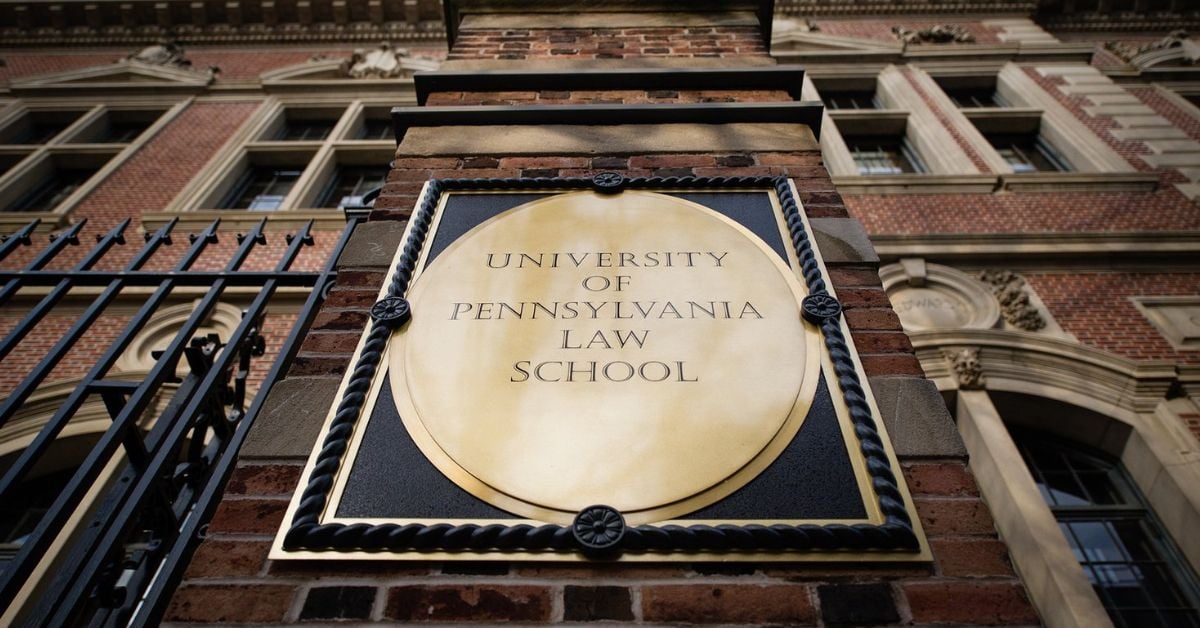
The University of Pennsylvania Law School is highly regarded for its strength in civil law. The law school, founded in 1850, is located in Philadelphia, Pennsylvania. Penn Law emphasizes an interdisciplinary approach, allowing students to take courses across the university’s other prestigious schools. The University of Pennsylvania Carey Law School offers diverse programs to meet various legal education needs. The Juris Doctor program provides a solid foundation through core courses in areas like Civil Procedure and Criminal Law. The Master of Laws program caters to international lawyers interested in U.S. law, while the Master in Law program benefits professionals seeking legal knowledge in non-law fields. The Doctor of Juridical Science focuses on extensive research for academic careers. Joint degree options further enhance interdisciplinary learning opportunities.
The University of Pennsylvania Carey Law School has an acceptance rate of 9.88% for the 2023-2024 academic year, reflecting its competitive nature. A total of 6,518 applicants applied, with 644 being admitted and 231 enrolling. Tuition for 2024 stands at $76,934, with the total cost of attendance reaching $101,722 annually. Financial aid supports 53.59% of full-time students, with an average grant of $40,000 covering significant tuition costs. University of Pennsylvania (Carey) Law School ranks No. 4 (tie) out of 196 law schools. The law school is reputed for interdisciplinary programs and close ties to business, policy, and healthcare sectors. Exceptional faculty and innovative curriculum strengthen its national standing.
The University of Pennsylvania Carey Law School offers specialized programs in civil law, emphasizing public service and civil rights. The Toll Public Interest Center supports pro bono projects that focus on social justice, while the Civil Practice Clinic provides students with hands-on experience representing clients in civil cases. Interdisciplinary opportunities with other Penn schools allow students to integrate social policy and human rights into their legal education. The University of Pennsylvania Carey Law School has a distinguished faculty specializing in civil law and related fields. Lou Rulli, a leader in public interest law, directs the Civil Practice Clinic and advocates for justice for underserved populations. Sophia Z. Lee, a legal historian, focuses on constitutional and administrative law, particularly civil rights issues. Shaun Ossei-Owusu contributes significant scholarship on civil rights and public interest law. The faculty members provide invaluable expertise and mentorship for students pursuing careers in civil law.
The University of Pennsylvania Carey Law School offers clinical opportunities focused on civil law and social justice. The Civil Practice Clinic allows students to represent clients in cases related to housing, employment, and family law. The Advocacy for Racial and Civil Justice Clinic provides hands-on experience in civil rights litigation, addressing systemic issues like racial inequality. Students work directly with local communities and organizations, gaining practical experience while advocating for civil justice. The clinics prepare students for impactful careers in civil law. The University of Pennsylvania Carey Law School provides strong networking opportunities through the Penn Carey Law Alumni Society, connecting students and alumni via events and mentoring programs. MyPenn, the university’s platform, links members to over 400,000 alumni across various legal sectors. The Toll Public Interest Center offers mentorship and career guidance for students pursuing civil law. Notable alumni include Damon Hewitt, a civil rights leader; Jena Griswold, a voting rights advocate; and Tsiwen Law, an advocate for Asian American rights and language access in courts.
The University of Pennsylvania Carey Law School offers a robust curriculum for students interested in civil law. Civil Procedure covers rules governing U.S. civil litigation, providing essential knowledge of the court system. Strategic Lawyering for Social Justice focuses on using legal strategies to drive social change, especially in civil rights cases. Mediation Theory and Skills helps students develop practical skills for resolving civil disputes outside of court. Advanced Problems in Federal Procedure tackles complex litigation issues arising in civil rights cases, preparing students for real-world challenges. The University of Pennsylvania Carey Law School reports strong employment outcomes, including civil law roles, with 73% in law firms and 11% in judicial clerkships.
6. Stanford Law School
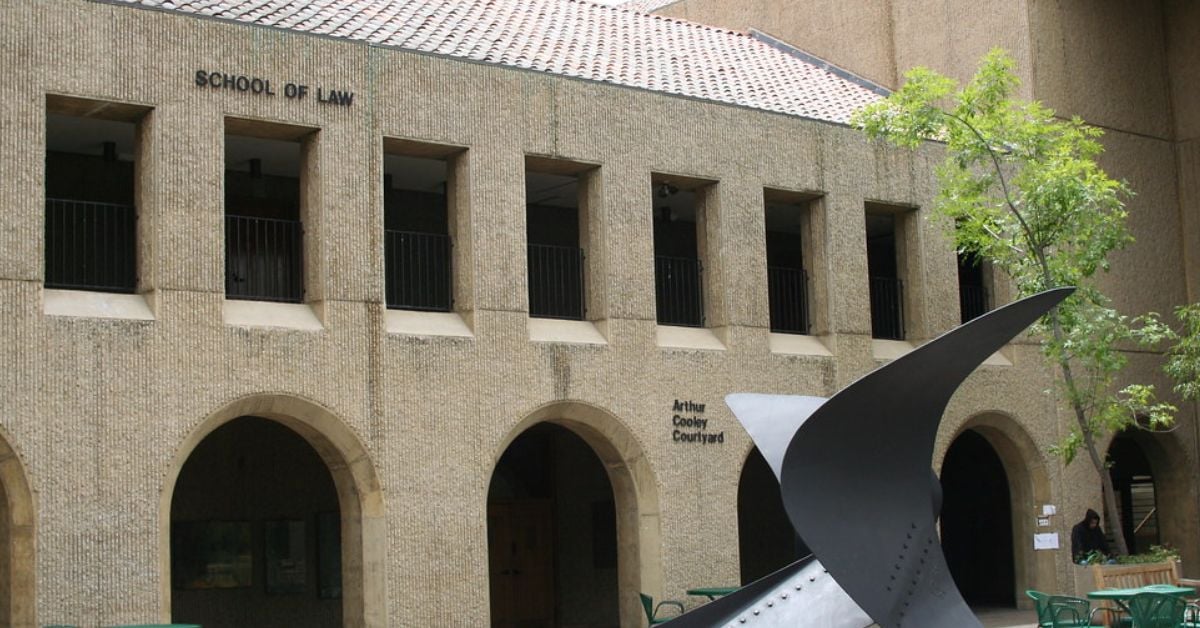
Stanford Law School is recognized as a leading institution for civil law, consistently ranked among the top law schools in the field. The law school, founded in 1893, is located in Stanford, California, at the center of Silicon Valley. The school offers an innovative and interdisciplinary approach to legal education, encouraging collaboration across various fields. Stanford Law School offers several law degrees tailored to different career paths. The Juris Doctor (JD) program lasts three years and prepares students to practice law in the U.S. The one-year Master of Laws (LLM) focuses on U.S. legal practices for international graduates, offering specializations in corporate, environmental, and international law. The Doctor of the Science of Law (JSD) suits lawyers pursuing academic careers in legal research. Joint degrees like the JD/MBA combine legal education with other disciplines.
Stanford Law School’s acceptance rate for 2024 stands at 7.26%, admitting only 353 out of 4,863 applicants. A total of 157 students enrolled, resulting in a yield rate of 44.48%. Stanford’s selectivity is significant compared to the national average of 42.35% for U.S. law schools. Tuition for the 2023-2024 academic year amounts to $73,713, with total attendance costs reaching $105,554. Financial aid reduces the total cost to around $71,355 for many students. Stanford University Law School holds the No. 1 (tie) position among 196 law schools. Stanford is regarded as one of California Best Law Schools, offering students unmatched opportunities in legal technology and innovation. The law school is reputed for cutting-edge research and innovative legal education. Prestigious faculty, interdisciplinary opportunities, and a selective admissions process contribute to its global prominence.
Stanford Law School offers specialized programs in civil law, providing practical and research-focused opportunities. The Civil Externship Program enables second and third-year students to work with nonprofits, public interest groups, and government agencies. The externship helps them develop civil law skills while earning academic credit. The Civil Justice Fellows Program, through the Deborah L. Rhode Center, focuses on access to justice in areas like eviction and family law. Fellows engage in research and policy reform to modernize civil legal systems. Stanford Law School has several notable faculty members who specialize in civil law and contribute to advancements in litigation and justice reform. David Freeman Engstrom is an expert in civil procedure and legal technology, focusing on how AI shapes civil justice. Nora Freeman Engstrom, recognized for her work in tort law and complex litigation, co-directs initiatives aimed at reforming civil justice. Norman W. Spaulding’s research centers on civil procedure and ethics, with a strong focus on litigation and advocacy. The scholars drive significant progress in civil law.
Stanford Law School offers clinical opportunities in civil law through the Mills Legal Clinic. The Community Law Clinic provides students with practical experience by representing low-income clients in housing, social security disability, and public benefits cases. Students handle every aspect of litigation, gaining essential skills in client interaction and oral advocacy. The Immigrants’ Rights Clinic allows students to work on civil rights cases affecting immigrant communities. The Supreme Court Litigation Clinic offers hands-on experience with high-stakes civil cases before the U.S. Supreme Court.
Stanford Law School provides strong networking opportunities through its alumni community. Alumni are prominent in civil law, holding positions in major law firms, academia, and the judiciary. Goodwin Liu serves as an Associate Justice on the California Supreme Court, while Michelle Alexander is an influential civil rights scholar. Nora Freeman Engstrom, recognized for her work in civil litigation, is another notable alumna. Networking events and regional alumni chapters across U.S. cities enable current students to connect with accomplished professionals in civil law.
Stanford Law School offers a range of courses in civil law, helping students deepen their expertise. Advanced Civil Procedure covers complex topics, including class actions and multidistrict litigation, essential for aspiring litigators. Civil Rights Law explores statutes like the Civil Rights Act and Voting Rights Act, highlighting their legal and social significance. Sociology of Law examines issues like mass incarceration and civil rights movements, connecting law to broader societal challenges. The courses, combined with clinical experiences, provide comprehensive civil law education. Stanford Law School graduates secure prestigious roles, including civil law positions in various sectors. The Class of 2023 saw 97.3% of graduates achieving full-time employment in diverse legal careers.
7. University Of Chicago Law School
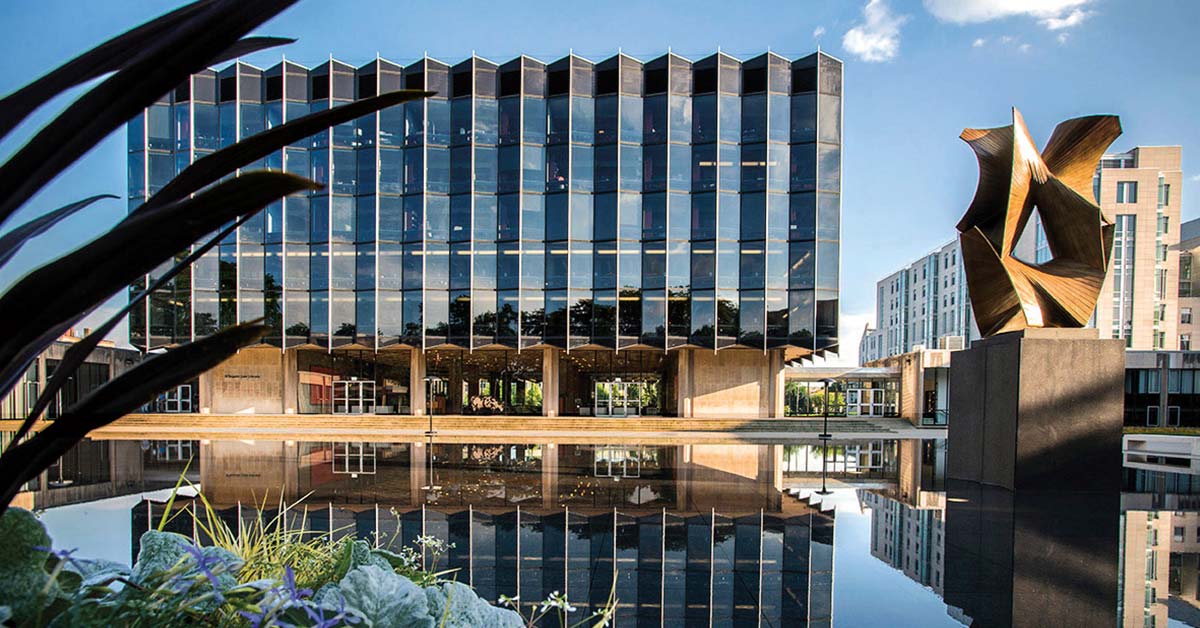
University of Chicago Law School is widely known for its strong focus on civil law, consistently ranking as one of the best law schools. The law school, established in 1902, is located in Chicago, Illinois, offering students access to a vibrant legal and business hub. The University of Chicago Law School offers various law degrees tailored to diverse professional goals. The Juris Doctor (JD) is a three-year program that emphasizes interdisciplinary legal education. Joint degree options include the JD/MBA, combining law with business education in partnership with the Booth School of Business. Students pursue a JD/MPP, merging legal studies with public policy in collaboration with the Harris School. Advanced degrees, like the one-year LLM or research-intensive JSD, further expand academic and career options. The MLS offers legal principles to non-law professionals.
The University of Chicago Law School has a 12.78% acceptance rate for the 2024 admissions cycle, reflecting the institution’s selectivity. Tuition for the 2024 academic year is $77,877, and the total cost of attendance, including living expenses, is estimated at $106,225. University of Chicago Law School ranks No. 3 among 196 law schools. The law school is reputed for its emphasis on economic analysis of law and intellectual rigor. A renowned faculty, small class sizes, and strong research opportunities enhance its academic reputation. The University of Chicago Law School offers specialized programs in civil law, providing students with advanced legal knowledge. Courses on civil procedure and litigation cover class actions and dispute resolution, which are essential for civil law careers. Environmental and torts law programs address civil liabilities related to environmental harm and public health. Comparative civil law explores international civil legal systems through courses on constitutional and antitrust law. Family and property law programs provide in-depth knowledge of civil disputes involving personal and property rights.
The University of Chicago Law School boasts several notable faculty specializing in civil law. William Hubbard is an expert in civil procedure and focuses on the economic analysis of courts and litigation. Craig Futterman, a leader in civil rights law, has played a key role in cases involving police misconduct. Darrell A. H. Miller brings expertise in civil procedure and constitutional law, particularly regarding the Second and Thirteenth Amendments. The distinguished professors offer students deep engagement with critical areas of civil law. The University of Chicago Law School offers several clinical opportunities in civil law for hands-on experience. The Civil Rights and Police Accountability Clinic allows students to engage with civil rights violations, focusing on police misconduct. The Employment Law Clinic provides opportunities to handle real cases involving workplace discrimination and wrongful termination. The Housing Initiative Transactional Clinic helps students address legal issues in affordable housing and tenant rights. The Global Human Rights Clinic expands students’ perspectives by focusing on international civil law and human rights violations.
The University of Chicago Law School has a strong network of notable alumni excelling in civil law. David M. Rubenstein, a co-founder of the Carlyle Group, is known for his contributions to legal reform and public policy. Craig Futterman, a prominent advocate for police reform, leads the Civil Rights and Police Accountability Project. Michael Schill, now President of Northwestern University, has influenced civil rights and housing law. Networking opportunities at UChicago Law include alumni events, mentorship programs, and career services connecting students with civil law professionals.
The University of Chicago Law School offers a wide array of civil law courses, providing students with comprehensive legal education. Advanced Civil Procedure explores complex litigation topics, including arbitration and class actions. Class Action Controversies focuses on the strategic challenges involved in class action litigation. Family Law, Property Rights, and Torts courses delve into key civil law areas essential for practice. The Employment Law Clinic adds practical experience in employment disputes, enriching students’ understanding of civil law concepts. The courses prepare students for civil law careers. The University of Chicago Law School reports strong employment outcomes, including civil law careers at top law firms. 99.1% secured full-time jobs within ten months of graduation for the Class of 2023.
8. Duke Law School
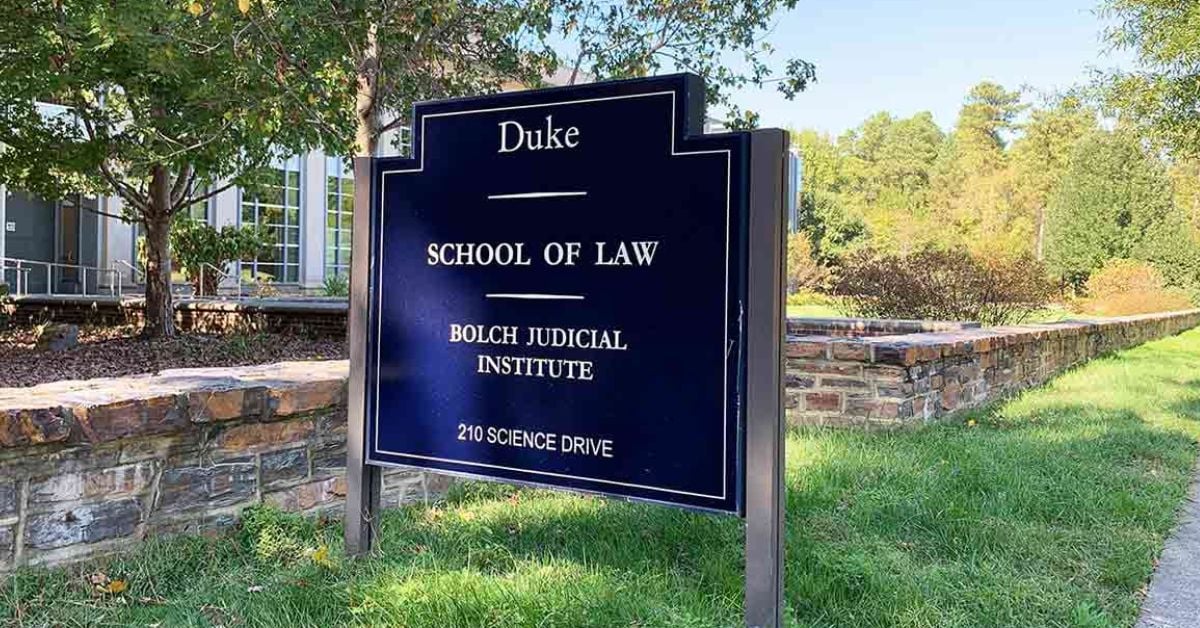
Duke Law School is highly regarded for its strength in civil law, consistently ranking among the top law schools in the area. Duke Law, founded in 1930, is located in Durham, North Carolina, within the prestigious Duke University. The school offers a rigorous curriculum integrating legal theory with real-world practice, fostering a comprehensive understanding of the law. Duke University School of Law provides various law degrees tailored to different career paths and academic interests. The Juris Doctor (JD), the primary law degree, offers a rigorous legal education with opportunities for clinics, externships, and research. The Master of Laws (LLM) is a one-year program designed for international students, offering insights into the U.S. legal system and specialized legal fields. The Doctor of Juridical Science (SJD) is ideal for lawyers seeking to engage in in-depth legal research and academia. The Master of Judicial Studies focuses on sitting judges who wish to study legal reforms and judicial institutions. Duke offers Dual Degrees, combining legal studies with fields like international law, public policy, or business management. The diverse programs allow students to pursue interdisciplinary studies while obtaining a comprehensive legal education.
Duke University School of Law’s acceptance rate for the 2023-2024 year stands at 10.51%. Annual tuition for 2024 is $75,618, and students must account for an estimated $16,454 in living expenses. 95% of students receive financial aid, with average awards of around $30,000. The figures underscore the financial commitment and academic rigor required for enrollment. Duke University Law School holds the No. 4 (tie) ranking among 196 law schools. The law school is reputed for blending legal theory with practical skills training. Top-tier faculty, strong global connections, and innovative research programs drive its success.
Duke University School of Law offers a specialized Constitutional Law and Civil Rights program focusing on constitutional theory and civil rights practice. Students gain practical experience through clinics and externships, working on real cases alongside experienced faculty. The Social Justice Lawyering program emphasizes advocacy for marginalized communities, blending legal education with hands-on civil rights work. Electives like Comparative Constitutional Law provide global perspectives, and the JD/LLM program integrates civil and comparative law with a focus on international legal frameworks.
Duke University School of Law boasts a distinguished faculty with deep expertise in civil law. The Civil Justice Clinic, led by Professor Charles Holton, provides hands-on experience in civil litigation, focusing on housing law and domestic violence cases. Professor H. Timothy Lovelace, a legal historian, specializes in the civil rights movement and its influence on international human rights law. The faculty members offer Duke Law students a rich blend of theoretical and practical civil law training. Duke University School of Law provides clinical opportunities through the Civil Justice Clinic, partnering with Legal Aid of North Carolina. Students handle civil cases involving housing disputes, landlord-tenant issues, foreclosures, and domestic violence. Experienced attorneys and faculty guide students in all aspects of civil litigation, from client interviews to courtroom representation. The clinic offers practical legal skills and benefits low-income North Carolinians who need access to legal aid. Students participate in other programs, including the Children’s Law Clinic and Community Enterprise Clinic.
Duke Law has a global network of 12,000 alumni, offering significant networking opportunities for students pursuing civil law careers. Alumni are prominent in diverse sectors, providing guidance, mentorship, and job leads. Notable alumni in civil law include Don Willett, a judge on the U.S. Court of Appeals, and Shanna Rifkin, a public interest lawyer focused on criminal defense. Duke’s Alumni Association organizes events and programs, helping students connect with professionals, explore legal markets, and gain insights into civil law pathways. Duke University, School of Law offers advanced courses and electives in civil law, enhancing the foundational knowledge from core classes. Conflict of Laws examines resolving legal disputes across multiple jurisdictions, providing insight into international and interstate legal conflicts. Employment Discrimination focuses on federal laws addressing workplace discrimination, covering topics like race and gender bias. The courses equip students with specialized skills for successful civil law careers. Duke Law graduates, including students pursuing civil law, achieve strong employment outcomes, with 97.9% securing long-term, full-time positions. A significant portion enter large firms, government roles, public interest sectors, and judicial clerkships.
9. University Of Michigan Law School
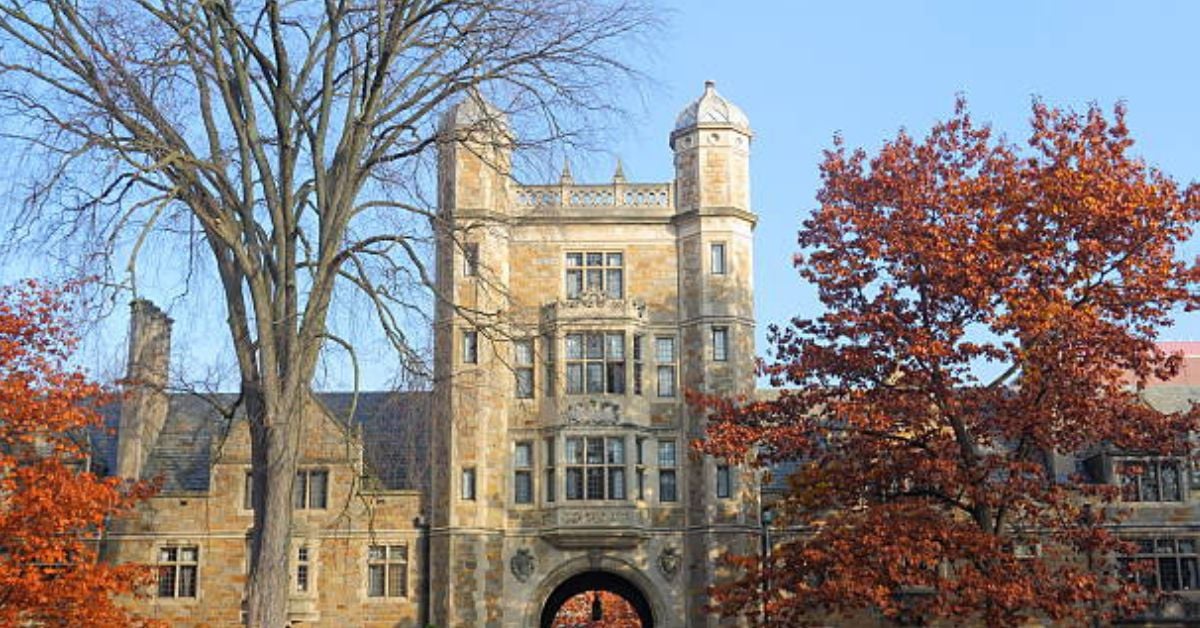
The University of Michigan Law School stands out as a top institution for civil law, consistently ranked among the best law schools in the field. The law school, established in 1859, is located in Ann Arbor, Michigan, offering students a vibrant and intellectually rich campus environment. The University of Michigan Law School offers several degrees, each catering to different legal career paths. The Juris Doctor (JD) is a three-year program that allows students to specialize in advanced coursework and clinics. The Master of Laws (LLM) is a one-year degree for individuals with prior legal education, focusing on U.S. law or specific legal areas. The Doctor of Juridical Science (SJD) emphasizes legal research and scholarship, which are ideal for academic careers. Dual degree programs combine the JD with disciplines like Business or Public Policy.
The University of Michigan Law School has an acceptance rate of 12.58%, admitting 808 of 6,425 applicants. Annual tuition for in-state students is $69,584, while out-of-state students pay $72,584. The total cost of attendance, including living expenses and personal costs, is estimated at $96,728 per year. 85% of students receive grants or scholarships, with an average grant amount of $30,000, significantly offsetting tuition costs for many students. University of Michigan—Ann Arbor Law School ranks No. 9 (tie) out of 196 law schools. The school is known for its highly regarded faculty and emphasis on theory and practice, earning a spot among Michigan Best Law Schools.
The University of Michigan Law School offers specialized opportunities in civil law through the Civil-Criminal Litigation Clinic. Students handle cases involving landlord-tenant disputes, consumer fraud, contract issues, and prisoners’ civil rights. The clinic provides hands-on experience, with students taking primary responsibility for client representation. Advanced courses in civil rights litigation and comparative law enhance the civil law curriculum. The LLM program includes U.S. civil law coursework, allowing international students to participate in litigation clinics and gain practical experience. The programs prepare students for impactful careers in civil law. The University of Michigan Law School features notable faculty specializing in civil law, providing expertise and mentorship. Margo Schlanger is a prominent authority in civil rights law, focusing on prison reform and immigration detention, and directs the Civil Rights Litigation Clearinghouse. Michael J. Steinberg, founder of the Civil Rights Litigation Initiative, has litigated numerous civil rights cases and mentors students in public interest litigation. Paulina Arnold brings expertise in civil detention and immigration law, enriching the school’s curriculum. The faculty members significantly enhance the civil law offerings for students.
The University of Michigan Law School offers clinical opportunities in civil law, providing students with hands-on legal experience. The Civil-Criminal Litigation Clinic allows students to handle cases involving landlord-tenant disputes, consumer fraud, and prisoners’ civil rights. Students take lead roles, managing all stages, from client interviews to courtroom trials. The Civil Rights Litigation Initiative enables students to work on cases addressing police misconduct, race discrimination, and wrongful convictions. The clinics equip students with practical skills for real-world civil law practice after graduation.
The University of Michigan Law School provides extensive networking opportunities for students interested in civil law through its robust alumni network. The Office of Career Planning and alumni events offer direct connections to professionals in civil law. Notable alumni include Michael J. Steinberg, director of the Civil Rights Litigation Initiative, and Margo Schlanger, an expert in civil rights and prison reform. The alumni have contributed significantly to civil law, offering current students mentorship and opportunities to engage in meaningful legal careers. The connections strengthen the school’s civil law community.
The University of Michigan Law School offers advanced civil law courses that focus on theoretical and practical aspects. Advanced Constitutional Law and Civil Rights courses explore themes of voting rights, racial equality, and human dignity. The courses examine complex issues such as reproductive justice and the application of constitutional protections. Civil Rights Litigation provides practical exposure through case simulations, focusing on areas like police misconduct and racial justice. Making of Civil Law examines civil law systems’ historical roots and evolution, offering a broad understanding of its modern application. The offerings provide a comprehensive foundation for civil law expertise. University of Michigan Law School graduates secure impressive employment outcomes, including civil law roles, with 95.4% securing long-term, full-time legal jobs.
10. University Of Texas Law School
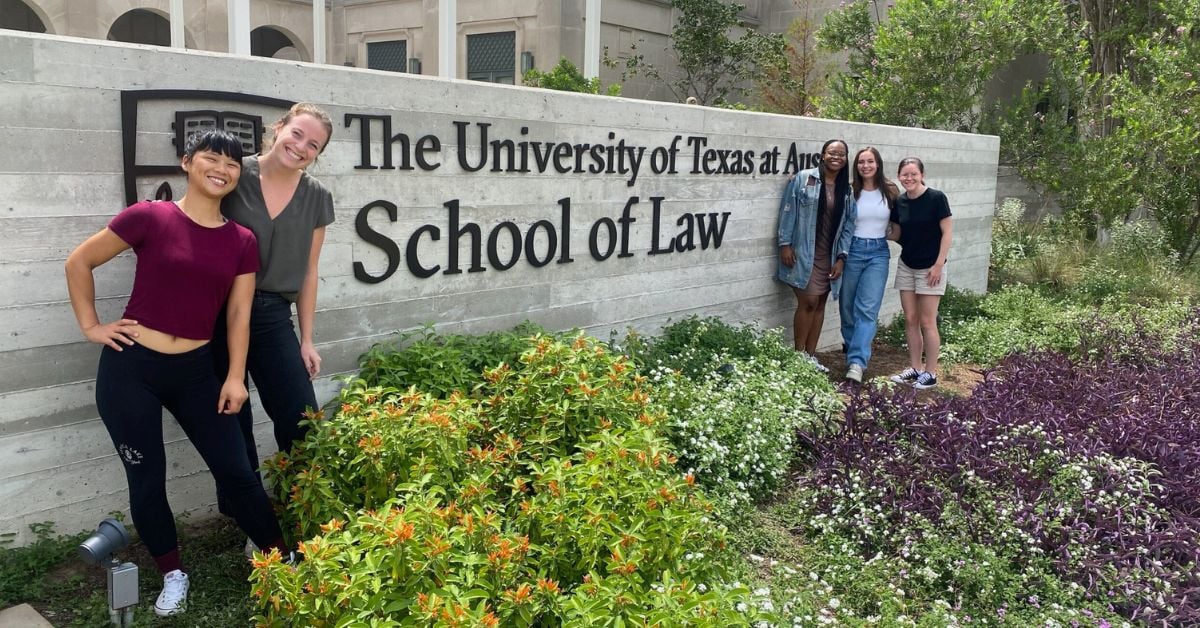
University of Texas School of Law is highly regarded for its expertise in civil law, consistently ranked among the best law schools in the discipline. The institution, established in 1883, is located in Austin, Texas, at the center of a thriving legal and business community. The University of Texas School of Law offers a comprehensive Juris Doctor (JD) program, a full-time, three-year degree designed to prepare students for legal practice in the U.S. The program includes foundational courses in contracts, torts, property law, and civil procedure, with opportunities to specialize in corporate or criminal law fields. The one-year Master of Laws (LL.M.) offers advanced study for students with a JD or equivalent degree with specializations in business law, environmental law, and human rights. Dual-degree programs, such as JD/MBA, combine legal education with other disciplines. The Doctor of Juridical Science (SJD) is a research-based degree for lawyers pursuing legal academia.
University of Texas—Austin Law School holds the No. 16 (tie) position among 196 law schools. The law school is reputed for strong programs in energy law and public service. The University of Texas School of Law has a competitive acceptance rate of 14.9% for the 2023-2024 academic year. Eight hundred forty-seven students were admitted out of 5,684 applicants, and 251 eventually enrolled, reflecting a yield rate of 29.6%. Tuition costs remain unchanged from the previous year at $36,429 annually for Texas residents and $54,096 for non-residents. Estimated living expenses, including housing and transportation, bring the total cost of attendance to $60,577 for residents and $78,244 for out-of-state students. Scholarships or grants benefit 92.45% of students, with an average award amount of $18,000. The University of Texas School of Law offers several specialized civil law programs for JD and LL.M. students. One of the key programs is the Civil Rights Clinic, where students gain hands-on experience in civil rights litigation and advocacy. The LL.M. program provides concentrations in U.S. Law for Foreign Lawyers and Human Rights & Comparative Constitutional Law.
The University of Texas School of Law has notable faculty specializing in civil law and related areas. Elizabeth Sepper is an expert on civil rights and anti-discrimination law, with a focus on public accommodations. Ranjana Natarajan directs the Civil Rights Clinic, guiding students through real-world civil rights litigation involving police misconduct and racial discrimination. Linda Mullenix, a specialist in civil procedure, has extensive knowledge of class action litigation and mass torts. Faculty members provide theoretical insights and practical legal experience in civil law.
The University of Texas School of Law offers students valuable clinical opportunities to gain experience in civil law. The Civil Rights Clinic allows students to represent clients in cases involving law enforcement abuse, prisoners’ rights, and discrimination. The Housing Policy and Housing Clinics engage students in eviction cases and housing discrimination matters. The Transnational Worker Rights Clinic focuses on protecting low-wage workers and handling cases related to labor rights and exploitation. The clinics provide essential real-world legal experience to future civil law practitioners.
The University of Texas School of Law provides excellent networking opportunities for students pursuing careers in civil law. The Texas Law Alumni Network allows students to connect with practicing civil rights attorneys through alumni events and mentorship programs. Participation in clinical programs, especially the Civil Rights Clinic, gives students direct access to experienced lawyers. Professional associations like the ACLU and the Texas Civil Rights Project enhance networking opportunities. Notable alumni in civil law include Ranjana Natarajan, director of the Civil Rights Clinic; Chad Dunn, a leading voting rights attorney; and Alejandra Ávila, former clerk for Justice Sonia Sotomayor.
The University of Texas School of Law offers advanced civil law courses to give students a deep understanding of the field. Texas Civil Procedure prepares students for Texas litigation practice, focusing on the Texas Rules of Civil and Appellate Procedure. Civil Rights Law explores areas like housing discrimination, employment law, and constitutional protections, with many courses tied to practical experiences through clinics. Advanced Litigation and Trial Advocacy courses provide hands-on trial practice, covering essential skills like opening statements and motion practice. Human Rights and Civil Liberties electives examine civil rights from a global perspective, linking civil and constitutional law issues. Graduates of the University of Texas School of Law, including lawyers specializing in civil law, achieve excellent employment outcomes. The Class of 2023 saw 96.8% of graduates secure full-time, long-term positions within ten months of graduation.
11. George Washington University Law School
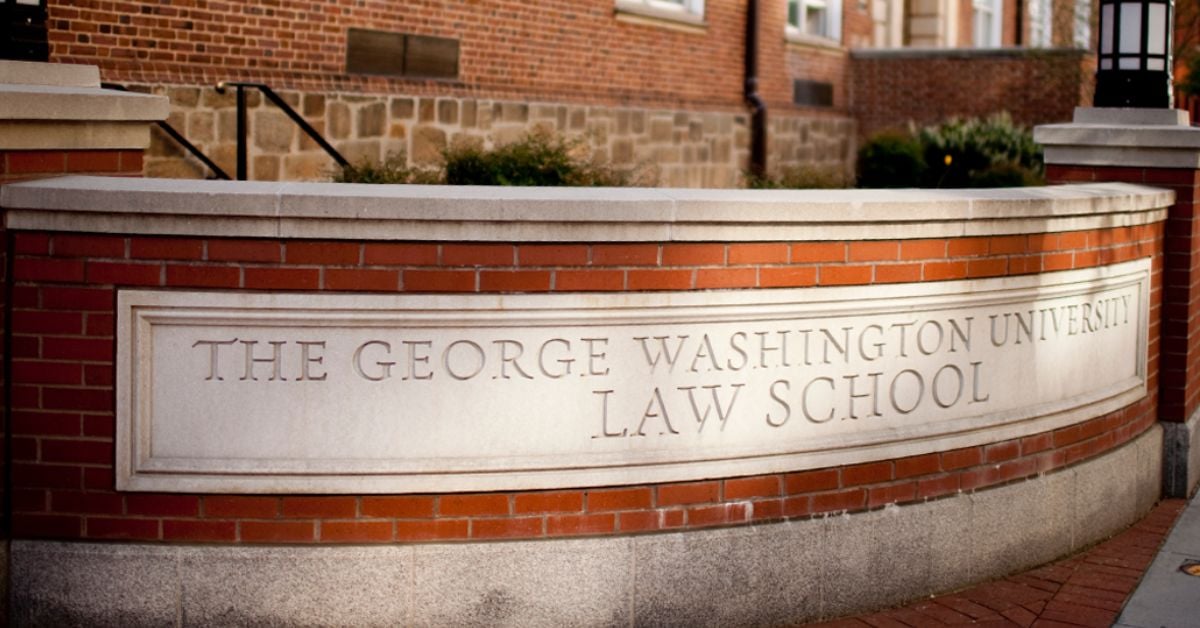
George Washington University Law School is recognized for its excellence in civil law. The law school, established in 1865 and located in Washington, D.C., provides students with direct access to the nation’s legal, political, and international institutions. George Washington University Law School offers a variety of law degrees catering to diverse career goals. The Juris Doctor (JD) is required to practice law, with full-time and part-time options available. Master of Laws (LLM) programs allow advanced study in areas like Environmental Law and National Security Law. The Master of Studies in Law (MSL) provides legal knowledge for non-lawyers in specialized careers. The Doctor of Juridical Science (SJD) focuses on research and academic work. Joint degree programs combine law with Business, Public Health, and International Affairs.
George Washington University Law School has a moderately selective acceptance rate of 28.72% for 2023-2024. Applicants generally present strong academic profiles, with a median LSAT score of 168 and a GPA of 3.85. Full-time JD students face a tuition cost of $69,740, while estimated living expenses add $30,260 annually. The total cost of attendance reaches about $100,000 per year. Students receive financial aid, with the average grant being $25,000, to help manage costs. George Washington University Law School ranks No. 41 among 196 law schools and No. 3 out of 68 in part-time programs. The law school is reputed for academic rigor and strong connections to key institutions.
George Washington University Law School offers specialized programs in civil law, focusing on constitutional law and civil rights, as well as courts and civil litigation. The programs provide in-depth study of civil rights, discrimination law, and human rights advocacy. The Civil and Human Rights Law Clinic gives students hands-on experience with live cases involving domestic and international human rights issues. GW Law offers advanced courses in civil litigation, constitutional rights, and tort law. The programs prepare students for impactful careers in civil law and rights advocacy.
Notable faculty in civil law at George Washington University Law School have made significant contributions to the field. Catherine J. Ross stands out for her work on constitutional rights, especially free speech. Mary Anne Franks has gained recognition for advocating legal reforms in privacy and civil rights. Arturo Carrillo leads efforts in international human rights law. The faculty’s expertise is highly influential, providing students with valuable insights into civil law. George Washington University Law School provides extensive clinical opportunities for students interested in civil law. The Civil and Human Rights Law Clinic allows students to work on real-world cases, advocating for clients facing discrimination. Students in the clinic gain practical experience in litigation and human rights advocacy, supervised by experienced faculty. The Jacob Burns Community Legal Clinics offer additional civil law-focused opportunities, where students represent low-income clients in matters of housing and family law. The clinics develop key skills, including client counseling and trial advocacy, essential for civil law practice.
George Washington University Law School offers strong networking opportunities through alumni events, mentorship programs, and connections with civil law professionals. GW Law actively supports student involvement with influential civil rights organizations. Notable alumni include Robert S. Bennett, known for his civil litigation work, and Jennifer M. Granholm, a leader in legal advocacy. The accomplished professionals provide inspiration and serve as mentors for current students. The law school’s vibrant network ensures that students are well-prepared for impactful careers in civil law.
George Washington University Law School offers an extensive range of civil law courses and electives, providing in-depth legal education. The Constitutional Law and Civil Rights curriculum includes courses like Civil Rights Law and Law of Separation of Powers, focusing on key issues in civil rights advocacy. The Courts and Civil Litigation program provides specialized electives, including Litigation with the Federal Government and Appellate Practice, designed to develop litigation expertise. Practical training is further enhanced through the Civil and Human Rights Law Clinic, where students gain hands-on experience in civil rights litigation and human rights advocacy. The Class of 2023 at George Washington University Law School, including civil law graduates, saw 91.67% secure employment.
12. Loyola Law School (Los Angeles)

Loyola Law School in Los Angeles is known for its strength in civil law and is consistently recognized as one of the top institutions in the field. The law school, established in 1920, is located in downtown Los Angeles, granting students access to one of the most prominent legal markets in the U.S.
Loyola Law School in Los Angeles offers a comprehensive selection of legal degrees catering to different professional goals. The Juris Doctor (JD) program includes full-time day and part-time evening options, providing flexibility. Joint degree programs like JD/MBA and JD/Tax LLM allow students to combine legal studies with business or tax expertise. Advanced degrees include a Master of Laws (LLM) with specializations like Taxation and Cybersecurity & Data Privacy. The Master of Science in Legal Studies (MLS) is available for students seeking non-lawyer legal knowledge. Academic careers are pursued through the Doctor of Juridical Science (SJD). Loyola Law School in Los Angeles has an acceptance rate of 33.92% for the 2023-2024 academic year. Full-time JD students face tuition costs of $68,512 for the 2024-2025 academic year. The estimated cost of attendance, factoring in living expenses, including room and board, reaches approximately $108,902 annually. The figures reflect the financial and academic expectations of prospective law students at Loyola Law School.
Loyola Marymount University Law School ranks No. 61 (tie) among 196 law schools and No. 6 (tie) out of 68 in part-time programs. The law school is reputed for a strong emphasis on experiential learning. Loyola Law School in Los Angeles offers several specialized programs focused on civil law. The Civil Litigation and Advocacy Concentration prepares students for civil litigation practice through comprehensive training. The Civil Justice Program advances civil justice issues by organizing seminars and conferences. Students pursue the Civil Litigation and Advocacy LLM, which allows an in-depth focus on civil legal matters. The specialized programs provide valuable opportunities for students interested in civil procedure and litigation expertise.
Loyola Law School in Los Angeles features notable faculty renowned for their expertise in civil law. Simona Grossi, an authority on civil procedure, focuses on litigation strategies and judicial processes. Robert Brain is highly respected for his work in civil litigation and appellate advocacy. John Nockleby, an expert in civil rights law and torts, leads the Civil Justice Program and advocates for justice reform. Faculty members provide valuable scholarship and practical guidance, enhancing students’ understanding of complex civil law issues. Loyola Law School in Los Angeles offers extensive clinical opportunities in civil law through the Social Justice Law Clinic. Students engage in live-client clinics, gaining practical experience in real-world legal matters. The Pro Se Mediation Advocacy Clinic trains students to handle civil rights mediation cases. The Juvenile Justice Clinic provides valuable experience representing minors in delinquency court. The Ninth Circuit Appellate Clinic allows students to work on civil and immigration appeals in federal court. The clinics develop essential skills in advocacy and litigation. Loyola Law School in Los Angeles provides extensive networking opportunities through a strong alumni network of over 19,000 members. Students benefit from alumni events, mentorship programs, and initiatives that focus on civil law, including the Civil Justice Program. Notable alumni include Johnnie Cochran, a renowned civil rights attorney, and Melanie Lomax, former head of the Los Angeles Police Commission. Charles Harder, known for his civil litigation work, and Laura Wasser, a distinguished family law attorney, further strengthen Loyola’s civil law influence.
Loyola Law School in Los Angeles offers a diverse range of advanced courses and electives in civil law, enhancing students’ understanding of litigation and advocacy. Civil Procedure and California Civil Procedure delve into foundational aspects of civil litigation processes. Civil Litigation Practice focuses on courtroom advocacy skills, preparing students for real-world litigation. The Civil Rights Litigation Practicum provides practical experience in civil rights law, while the Collaborative Family Law Clinic offers exposure to family law cases. The courses and clinics equip students with essential knowledge and skills for careers in civil litigation, advocacy, and public interest law. Loyola Law School in Los Angeles boasts strong employment outcomes, including civil law careers, with 90.5% of the Class of 2023 securing jobs within ten months of graduation. Graduates have successfully entered diverse legal fields, reflecting the school’s commitment to career readiness.
13. University Of Virginia School Of Law
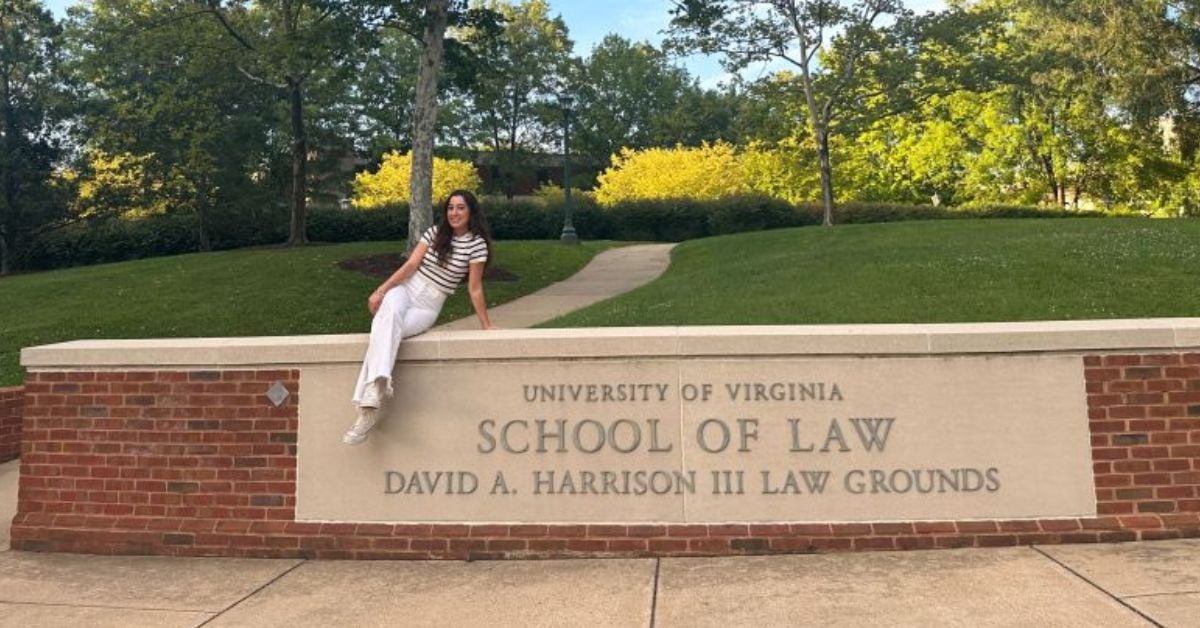
University of Virginia School of Law is highly esteemed for its focus on civil law, consistently ranked among the top law schools in the nation. The school is based in Charlottesville, Virginia, and has offered students a beautiful and stimulating environment since its establishment in 1819.
The University of Virginia School of Law offers the J.D., LL.M., and S.J.D. degrees. The J.D. is a three-year program preparing students for legal practice, with dual-degree options like J.D.-M.B.A. and J.D.-M.P.H. The LL.M. is a one-year program for graduates expanding their legal expertise in areas including human rights and business law. The S.J.D., the most advanced degree, targets lawyers pursuing academic or research careers. UVA Law provides clinics and concentrations for specialized legal training.
The University of Virginia School of Law had an acceptance rate of 11.46% for the 2024-2025 academic year. Virginia residents pay $74,700 annually in tuition, while out-of-state students are charged $77,700. The total cost of attendance, including living expenses, reaches $102,870 for Virginia residents and $105,870 for non-residents. 66.26% of students receive financial aid, with an average award of $30,000. University of Virginia Law School holds the No. 4 (tie) ranking among 196 law schools. The law school is reputed for its rigorous academic environment and strong judicial clerkship placements. The University of Virginia School of Law offers specialized programs focusing on civil law areas. The Civil Rights Litigation and Racial Justice and Law courses allow students to explore civil rights law. The State and Local Government Policy Clinic provides practical experience related to civil law issues. Programs like Constitutional Law and Legal History offer deep insight into civil law’s connection to constitutional frameworks. Students study regulatory law and policy, preparing for roles in public service that address civil law regulations. The programs provide comprehensive civil law expertise.
The University of Virginia School of Law boasts notable faculty members specializing in civil law. Risa Goluboff, an expert in civil rights and constitutional law, has extensively studied the evolution of civil rights in 20th-century America. Alice Abrokwa brings expertise in disability and antidiscrimination law, focusing her research on protecting vulnerable populations. Kimberly Jenkins Robinson, a scholar of educational equity, directs the Center for the Study of Race and Law. UVA Law’s faculty provides exceptional knowledge in key areas of civil law and civil rights. The University of Virginia School of Law offers valuable clinical opportunities for students in civil law. The Civil Rights Clinic provides experience in litigation and policy advocacy related to poverty, race, and mental health. The Economic and Consumer Justice Clinic allows students to represent low-income clients in financial disputes. The Housing Litigation Clinic gives students the chance to work on landlord-tenant conflicts. The Youth Advocacy Clinic focuses on supporting low-income youth facing legal challenges in education and juvenile justice.
The University of Virginia School of Law boasts a strong network of distinguished alumni in civil law. Richard Cohen, a notable graduate, led impactful civil rights litigation as former president of the Southern Poverty Law Center. Kim Michele Keenan, another prominent alumna, served as general counsel for the NAACP and now leads efforts in digital civil rights. UVA Law’s Pro Bono Program and Legal Aid Justice Center offer students networking opportunities, fostering connections with alumni who provide mentorship and professional growth. The University of Virginia School of Law offers advanced courses in civil law, providing students opportunities to engage deeply with specialized topics. Civil Rights Litigation focuses on racial justice and includes hands-on experience through real-world cases. The Decarceration and Community Reentry Clinic explores criminal justice reform, offering practical exposure. The Regulation of the Political Process course examines legal frameworks around elections and civil liberties. Students in the Economic and Consumer Justice Clinic litigate civil matters involving financial disputes. The Public Law Colloquium enriches understanding of policy-making processes, equipping students with comprehensive legal and advocacy skills in civil law. The University of Virginia School of Law graduates excel in securing top positions, including civil law roles. The Class of 2023 achieved a remarkable 99.3% employment rate in full-time, long-term jobs.
How To Choose The Best Law School For Civil Law?
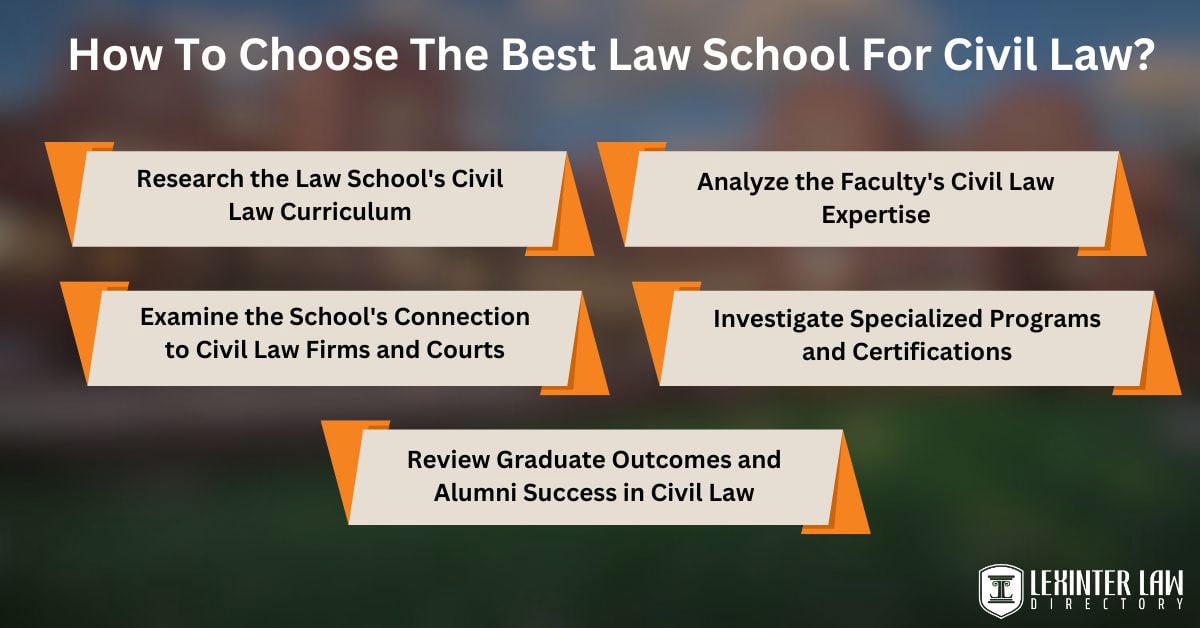
To choose the best law school for civil law, follow the five steps listed below.
- Research the Law School’s Civil Law Curriculum. Evaluate each law school’s specific civil law curriculum to ensure a comprehensive program. Schools with a strong focus on civil law offer specialized courses on contracts, torts, property law, and family law. Look for professors with expertise in civil law and the research they contribute to the field. Ensure there are hands-on learning opportunities, such as legal clinics and internships centered around civil law practices.
- Analyze the Faculty’s Civil Law Expertise. Assess the depth of the civil law expertise within the faculty. The best civil law schools have professors who have significant academic and practical experience in civil law areas. Investigate their published works, court experiences, and involvement in civil law reform. Mentorship from well-established legal professionals influences education and future careers. Strong faculty involvement in civil law cases enhances knowledge and professional connections.
- Examine the School’s Connection to Civil Law Firms and Courts. Consider the school’s partnerships with civil law firms, courts, and government agencies. The connections provide students with externships, networking opportunities, and potential job placements. Schools with close ties to the civil law community have alumni who are leaders in civil law practices. Internships and clerkships offered through the partnerships offer practical experience and real-world exposure to civil law cases.
- Investigate Specialized Programs and Certifications. Look into additional certifications and specialized civil law programs offered by the school. Several law schools provide certificates or dual degrees that focus exclusively on civil law topics. Earning the credentials enhances expertise and marketability. Extra certifications in civil procedure, contract law, or family law demonstrate the specialization to future employers.
- Review Graduate Outcomes and Alumni Success in Civil Law. Check the employment statistics of graduates in civil law careers. A school’s ability to place graduates in top civil law firms, nonprofit organizations, or government roles speaks volumes about its reputation. Research where alumni work and whether they are making notable contributions to civil law. Successful alumni networks in civil law provide valuable guidance, mentorship, and career connections, ensuring stronger professional development after graduation.
What Is Civil Law?
Civil law is a legal system that primarily governs private rights, obligations, and disputes between individuals. The law contrasts with criminal law, which deals with offenses against the state. Civil law addresses issues such as contracts, property rights, and family disputes. Individuals pursuing a civil law degree focus on understanding legal frameworks court procedures, and resolving disputes without involving criminal penalties.
Civil law programs prepare students for careers as attorneys, judges, or legal advisors by offering practical knowledge of litigation, arbitration, and mediation. Countries influenced by Roman law, including most European and Latin American nations, practice civil law. The nations emphasize written statutes rather than legal precedents. The U.S. law system, unlike countries with civil law traditions such as France or Germany, balances written statutes and legal precedents. Precedents, or past judicial rulings, play a crucial role in how courts interpret and apply laws, with statutes providing the underlying legal framework. The approach allows for legal consistency and adaptability as the law evolves. A comprehensive understanding of civil statutes is essential for resolving personal and commercial legal matters.
Civil law covers non-criminal disputes between individuals, organizations, or government entities. The law focuses on resolving conflicts over property, contracts, personal injuries, family matters, and obligations. People file lawsuits seeking compensation, remedies, or the enforcement of rights. Courts address issues like breach of contract, property disputes, and negligence cases under the branch. Tort law is a significant aspect of civil law, handling claims of harm or damage to individuals’ lives or property.
Tort cases include incidents involving accidents, medical malpractice, or defamation. Family law, another component, manages matters of divorce, child custody, and spousal support. Civil law addresses disputes concerning real estate, business transactions, or consumer protection laws. Monetary damages or equitable relief are awarded when courts find liability in a civil case. Legal procedures involve filing a complaint, gathering evidence, and presenting arguments before a judge or jury. Civil law, unlike criminal law, does not aim to punish but to provide a fair resolution to the parties involved. Cases are settled through negotiations, arbitration, or mediation before reaching trial stages.
What Is The Primary Goal Of Civil Law?
The primary goal of civil law is to resolve disputes between individuals or organizations and offer remedies for non-criminal matters. The purpose of civil law is to protect individual rights, compensate for harm, and enforce legal obligations. Civil law establishes legal frameworks that protect individual rights and enforce obligations. Parties seek financial compensation, equitable relief, or the enforcement of agreements through legal processes. Civil law ensures that justice is served by offering fair solutions, whether through monetary compensation or equitable relief. The law’s purpose is to restore balance and uphold social order by resolving conflicts in a structured manner.
Civil law works through a formal legal process where a plaintiff initiates a lawsuit against another party, seeking compensation or enforcing an agreement. The court examines evidence, hears arguments from each side, and determines liability. A judge or jury evaluates the facts and issues a decision, generally awarding damages or ordering other remedies. Several civil cases are resolved before reaching trial, as parties settle disputes through negotiation, mediation, or arbitration. The court’s focus, when a trial does occur, remains on delivering a fair outcome based on the law and the presented evidence. Civil law functions to ensure that individuals or entities receive justice without the intent of punishing the defendant but rather compensating the victim or enforcing agreements.
What Is The Benefit Of Civil Law?
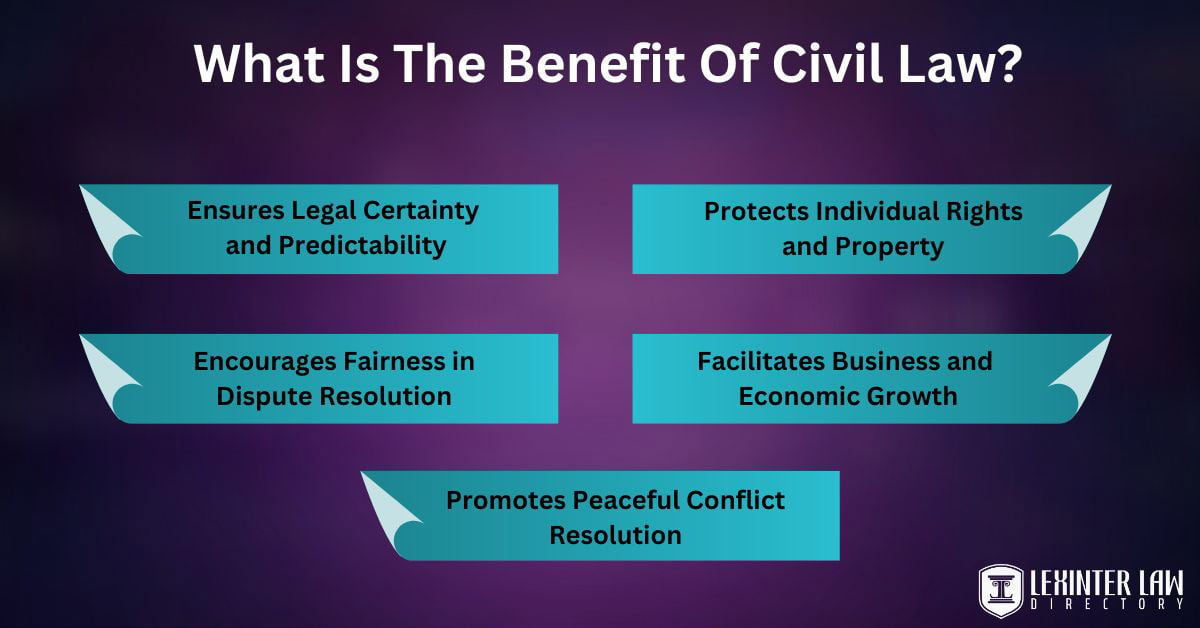
The five benefits of civil law are listed below.
- Ensures Legal Certainty and Predictability: Civil law creates a structured legal system that provides clear guidelines for resolving disputes. Individuals and businesses anticipate how laws are applied in specific cases. Courts rely on established statutes to deliver consistent judgments. Legal predictability encourages people to adhere to laws, fostering stability in society and reducing potential conflicts.
- Protects Individual Rights and Property: Civil law safeguards personal rights and property by offering remedies to individuals. Civil law provides a legal framework for seeking justice when harm or infringement occurs. Individuals take legal action to recover damages or protect assets. The protection reinforces the importance of accountability and responsibility in personal and business relationships.
- Encourages Fairness in Dispute Resolution: Civil law promotes fairness by ensuring that legal disputes are resolved based on predefined rules. Courts evaluate cases according to established legal principles, avoiding arbitrary decisions. The process guarantees that everyone is treated equally, regardless of social status. Fair resolution of disputes fosters trust in the judicial system and upholds social harmony.
- Facilitates Business and Economic Growth: Civil law helps maintain a stable environment for business by regulating contracts and commercial relationships. Businesses rely on civil law to enforce agreements and resolve disputes efficiently. A predictable legal system enables entrepreneurs to plan long-term investments with confidence. The legal stability stimulates economic growth and attracts foreign investment.
- Promotes Peaceful Conflict Resolution: Civil law encourages resolving conflicts through legal channels rather than through force or retaliation. Courts act as neutral third parties, offering a structured process for resolving disputes. The approach reduces violence and social unrest, promoting harmony in communities. Legal resolution of conflicts strengthens societal cohesion and discourages vigilantism or unlawful behavior.
What Is The Best Degree For Civil Law?
The best degree for civil law is the Juris Doctor degree. The program provides the foundational legal knowledge and practical skills necessary for representing clients in civil disputes. JD programs are designed to cover essential areas, including contract law, property law, and torts, which are core elements in civil litigation. The degrees offer academic study and hands-on training through clinics, internships, and mock trials. Completing a JD allows graduates to sit for the Bar exam, a requirement for legal licensure in most U.S. jurisdictions. Civil law practice requires attorneys to understand complex regulations governing property rights, contractual obligations, and personal injury cases. JD candidates gain experience in applying legal theory to real-world issues during their time in law school. Students participate in activities like legal research, drafting court documents, and advising clients. The practical exposure is invaluable for students aiming to become proficient civil law practitioners. JD graduates are better prepared to argue cases before courts or negotiate settlements in civil disputes. Legal education at the level equips future attorneys with the skills necessary for analyzing and resolving complex legal issues. A JD offers rigorous academic training and the practical experience needed to handle disputes effectively in civil courts. Law schools include externships with law firms or judicial offices, ensuring graduates are well-prepared for practice. Earning a JD is a comprehensive pathway for individuals who want to specialize in civil law, making it an indispensable degree for legal professionals.
How To Become A Civil Lawyer?
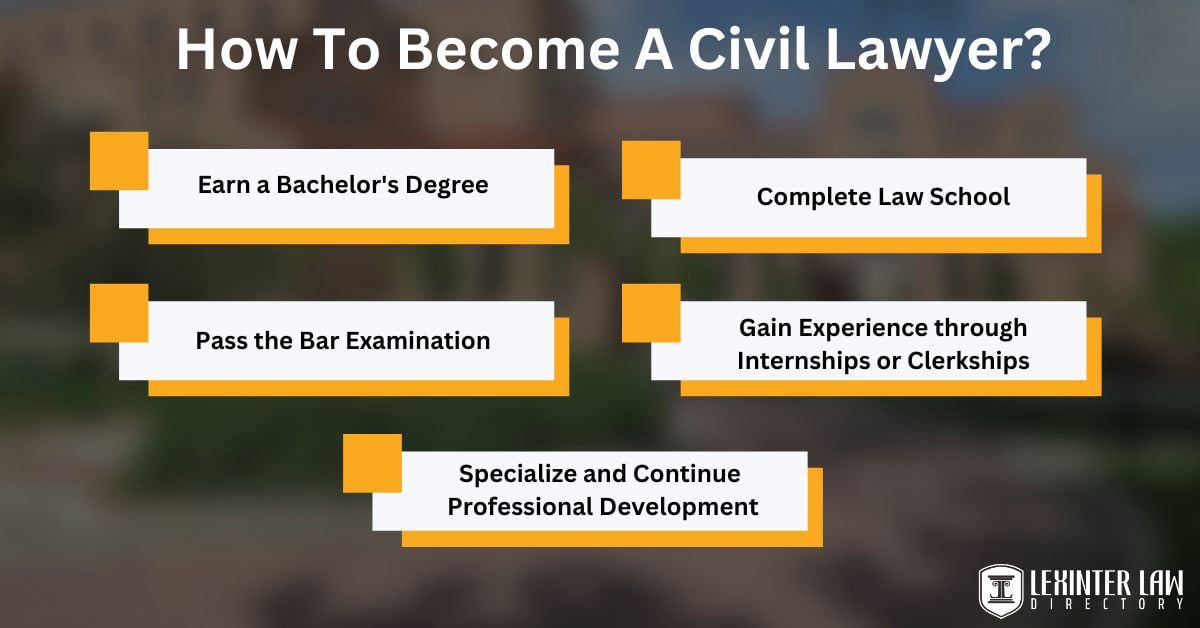
To become a civil lawyer, follow the five steps listed below.
- Earn a Bachelor’s Degree. Aspiring civil lawyers must first obtain a Bachelor’s degree in a relevant field. Degrees in political science, history, or business provide a strong foundation. Coursework in government, ethics, public speaking, and economics enhances critical thinking skills. Maintaining a high GPA helps when applying to law school. Participating in internships or mock trial programs builds practical experience. A strong educational background is essential for succeeding in law school and passing future legal exams.
- Complete Law School. Attending law school is the next step toward earning a civil law degree after obtaining a Bachelor’s degree. Accredited law schools offer a Juris Doctor (JD) program that generally lasts three years. Law students must complete courses in civil law, torts, contracts, and legal writing. Practical experiences, such as internships or clinics, help develop essential skills. Graduating with a JD degree qualifies students to sit for the Bar exam and continue toward legal practice.
- Pass the Bar Examination. Civil lawyers must pass the Bar examination to practice law. Each state administers its own Bar exam, which tests knowledge of general law and civil law specifically. Preparation for the Bar exam requires intensive study of state-specific and federal legal principles. Additional materials, such as past Bar exams and review courses, improve performance.
- Gain Experience through Internships or Clerkships. Practical experience through internships or clerkships enhances legal knowledge and skills. Law firms, government agencies, or nonprofit organizations offer civil law internships to recent graduates or law students. A clerkship with a judge offers valuable insight into courtroom procedures and legal decision-making. Experience gained during the roles strengthens legal understanding and builds a professional network, increasing opportunities for future employment in civil law.
- Specialize and Continue Professional Development. Specializing in a specific area of civil law, such as family or employment law, is essential for career growth and a critical step in understanding how to become a civil lawyer. Continuous professional development through legal seminars, workshops, and additional certifications helps maintain expertise. Membership in professional associations offers networking opportunities and access to resources. Staying updated on legal changes and industry trends ensures civil lawyers remain competitive and well-informed in their practice.
How Long Would It Take To Study Civil Law?
It would take at least seven years to study civil law after high school. The first step involves completing a four-year undergraduate degree, which is required before entering law school. Students major in any discipline, though courses in political science or history provide useful foundations. The next step, after completing an undergraduate program, involves attending law school, which generally takes three years. Law schools offer specialized courses in civil law, allowing students to gain a deep understanding of the subject. The first year of law school, known as 1L, introduces students to essential legal concepts such as contracts, torts, and civil procedure. The first year is demanding because it builds the framework for understanding how civil law operates within society. Second-year students, or 2Ls, explore more specialized topics like civil rights law, family law, or employment law. Students participate in internships or clinics, gaining practical experience with real-world civil law cases, which is vital for their legal training.
Students wrap up their academic requirements during the third year, or 3L, while refining their civil law expertise. Law students engage in externships or participate in civil law moot court competitions to sharpen their skills in courtroom procedures. The final year prepares students for the Bar exam, which is required to practice civil law in any jurisdiction. The Bar exam itself generally demands several months of dedicated study. Graduates, after passing the exam, begin their careers in various areas of civil law, including litigation, contract law, or family law. Several civil lawyers choose to specialize further through additional certification or advanced degrees. The standard timeline is seven years, but many factors, such as internships and specialization, slightly extend the period. Each phase builds toward a comprehensive understanding of civil law’s intricate framework.
What Is The Average LSAT For Civil Law?
The average LSAT score for admission to law schools generally ranges between 150 and 152. The LSAT, or Law School Admission Test, is a standardized test required for most law schools. The test plays a crucial role in law school admissions. Law schools evaluate applicants based on LSAT scores, undergraduate GPA, and other factors. The LSAT tests skills necessary for success in law school, including critical reading, analytical reasoning, and logical reasoning. The exam consists of five sections, each lasting 35 minutes. Four sections contribute to the final score, while one is an unscored experimental section. There is a writing sample that schools use to assess an applicant’s writing skills. Scores required for admission vary significantly depending on the competitiveness of the institution. Mid-tier law schools generally require LSAT scores between 155 and 165 for applicants to remain competitive. Top-tier law schools like Yale and Stanford require LSAT scores in the 170s. T14 law schools usually expect scores above 160 from competitive applicants. Civil law programs vary in their LSAT expectations, depending on the reputation of the institution. Online LSAT preparation courses, practice exams, and tutoring services help students improve their scores. Preparing for the LSAT is crucial to achieving admission into desired law schools. Targeting an excellent LSAT score opens doors to competitive law schools offering specialized civil law programs.
Is Civil Law Difficult?
Yes, civil law is difficult. Civil law is considered difficult because the law encompasses a broad range of legal issues. The branch of law governs disputes between individuals or organizations, requiring a deep understanding of various legal principles. The system involves numerous subfields, including contracts, property, torts, and family law, each with its own complexities. Civil law demands a precise interpretation of statutes and legal codes, which is lengthy and intricate. Legal practitioners must navigate through detailed documentation and understand how specific statutes apply to individual cases. The interpretation of civil law depends on precedent, requiring familiarity with a vast body of case law. Legal professionals must analyze previous decisions and apply them to current circumstances. Evolving interpretations complicate the task over time as courts continuously refine legal principles. Civil law involves intricate procedural rules, requiring careful adherence to timelines, documentation, and the presentation of evidence. Failure to meet procedural requirements results in significant setbacks for litigants. Civil law cases involve multiple parties and complex factual scenarios, making them challenging to resolve. Lawyers must examine all relevant details to build strong arguments, working through extensive negotiations and settlements. Outcomes in civil cases are highly variable and influenced by the specific facts and the interpretation of the law by the courts. The dynamic and multifaceted nature of civil law makes it difficult, even for experienced legal practitioners. An extensive knowledge base and strong analytical skills are essential for successfully navigating the complex legal field.
What Can You Expect From A Career As A Civil Lawyer?
You can expect competitive salaries, job stability, growth opportunities, and benefits such as health insurance and retirement plans from a career as a civil lawyer. Specializing in high-demand areas further boosts income and career prospects. A career as a civil lawyer offers opportunities for professional growth, salary increases, and various benefits. Civil lawyers in the United States generally earn between $80,000 and $150,000 annually. The range depends on experience, specialization, and geographical location. Civil litigation lawyers tend to earn higher salaries, between $116,954 and $134,236. Civil lawyers working in major cities or prestigious firms see higher earnings. Opportunities for career growth and higher earnings tend to increase as professionals gain more experience. Benefits such as health insurance, retirement plans, and paid time off are commonly offered in the field. Several law firms provide continuous education opportunities, helping civil lawyers sharpen their skills and stay current with legal developments. Job stability in civil law is relatively high, as disputes over contracts, property, and other legal matters are constant. Civil lawyers choose between working in large firms, smaller practices, or even starting their own law firms, giving them control over their career trajectory. Networking, reputation, and successful case outcomes significantly impact career progression and salary potential. Lawyers who build a strong reputation attract higher-paying clients and more prestigious cases. Civil lawyers enjoy the flexibility of specializing in diverse areas, which enhances long-term career satisfaction and financial success. The combination of skill, experience, and adaptability plays a key role in shaping a rewarding career as a civil lawyer.
What Is The Difference Between A Civil Lawyer And A Criminal Lawyer?
The difference between a civil lawyer and a criminal lawyer lies primarily in the types of cases they handle and the legal processes involved. A civil lawyer handles disputes between individuals or organizations, focusing on resolving private legal matters. Criminal lawyers represent clients accused of crimes and work to defend their rights in court. Civil cases generally involve compensation claims, contracts, property disputes, or personal injury. Criminal cases deal with offenses like theft, assault, or murder, where the accused faces penalties such as fines or imprisonment. Civil lawyers seek settlements or court judgments through negotiation or litigation. Criminal lawyers aim to prove innocence or reduce charges during criminal proceedings. Civil lawyers work mostly in non-criminal legal areas, while criminal lawyers specialize in defending against state or federal prosecutions. Civil cases usually require proving liability or responsibility, whereas criminal cases require proving guilt beyond a reasonable doubt. A civil lawyer handles issues like contract breaches, while criminal lawyers focus on defending against legal penalties or charges.
The similarities between a civil lawyer and a criminal lawyer lie in their role of representing clients within the legal system. Each focuses on protecting their client’s rights and providing expert legal advice throughout the case. The civil and criminal lawyers must gather evidence, research legal precedents, and prepare persuasive arguments. The lawyers present their cases, question witnesses, and advocate for their clients before a judge or jury in the courtroom. Negotiation skills are essential for each, as they seek to resolve matters through settlements or plea deals. The professions require a deep understanding of legal procedures, critical thinking, and strong communication abilities. Each lawyer uses strategic approaches to achieve the best outcome regardless of the type of case. Civil and criminal lawyers work within a structured legal framework to ensure justice and fairness for their clients.
How Do Civil Lawyers Earn?
Civil lawyers earn by providing legal representation, offering consultations, drafting legal documents, and participating in mediation or arbitration. The lawyers increase their income through teaching, conducting seminars, and writing expert legal opinions. Civil lawyers in the United States generally earn an average yearly salary ranging from $80,000 to $150,000. The range varies based on factors such as location, experience, and specialization. Civil litigation lawyers, for instance, earn an average salary between $116,954 and $134,236, with some professionals in cities like San Francisco earning as much as $173,883 annually.
Lawyers generate income through several professional avenues. Court representation forms a significant portion of their earnings, where fees range from $1,000 to over $10,000 per case, depending on complexity. Legal consultations contribute, with charges between $100 and $500 per session. Civil lawyers diversify their income by offering document drafting services such as contracts or wills, charging flat fees ranging from $1,000 to $5,000 per document. Civil lawyers earn by teaching in law schools or conducting legal training programs, which yield annual salaries between $60,000 and $170,000. The lawyers participate in seminars and workshops, earning between $500 and $5,000 per event. Another important income source is mediation or arbitration services, where they act as neutral parties resolving disputes, charging hourly rates of $300 to $800. The varied income streams enable civil lawyers to build substantial yearly earnings, with opportunities to enhance their income through multiple roles.
Where Do Most Civil Lawyers Work?
Civil lawyers work in law firms, government agencies, corporations, or nonprofit organizations. A civil law law firm provides a structured environment where attorneys collaborate with colleagues on complex legal issues. Civil lawyers within the setting represent individuals or companies in cases related to personal injury, contract disputes, property disputes, and employment law. The firms generally range in size from small boutique practices to large, multi-office operations. Lawyers in the environments manage client interactions, draft legal documents, and prepare cases for trial or settlement. Civil lawyers are employed by government agencies, offering legal services on behalf of the public sector. Attorneys handle cases involving regulatory enforcement, government contracts, and civil rights within the organizations. The lawyers work closely with policymakers or serve in roles supporting public litigation. Civil lawyer’s responsibilities include research, drafting legal opinions, and advising various governmental departments. Public service roles offer a more predictable workload but involve challenging legal questions with significant social impact.
Corporate legal departments are another primary employer of civil lawyers. The attorneys work within businesses, handling internal legal matters that affect the organization. The lawyer’s duties revolve around contract negotiations, compliance issues, and protecting intellectual property. Civil lawyers, working within a corporate environment, collaborate with executives and various departments to ensure compliance with legal regulations. Nonprofit organizations offer career paths for civil lawyers as well. Attorneys in the sector generally focus on causes related to human rights, environmental law, or social justice. The lawyers provide legal aid to marginalized communities or work to influence policy reform. Legal professionals within nonprofit organizations face tight budgets, but they frequently engage in impactful, mission-driven work that serves public interests.
Are Civil Lawyers Highly Paid?
Yes, civil lawyers are generally highly paid, with annual salaries ranging from $80,000 to $150,000 in the United States. The salary level depends on various factors, including experience, specialization, and geographical location. Civil litigation lawyers who handle lawsuits involving disputes between individuals or organizations earn between $116,954 and $134,236 annually. Professionals working in large cities or prestigious firms tend to earn higher salaries due to the complexity and volume of cases they manage. The income tends to increase as civil lawyers advance in their careers. Senior lawyers with many years of experience or lawyers who specialize in high-demand fields like corporate law, intellectual property, or personal injury law see significantly higher salaries. Lawyers who handle high-profile cases or represent large corporations command premium rates for their expertise. Civil lawyers frequently enjoy bonuses, profit-sharing arrangements, and other financial incentives that further enhance their earnings. Civil lawyers usually receive comprehensive benefits, including health insurance, retirement plans, and paid time off, besides competitive salaries. Opportunities for career growth and professional development contribute to long-term financial success. The combination of all the factors makes civil law a financially rewarding career for lawyers who excel in the field.
How Can I Find Good Civil Lawyers Near Me With Lexinter?
You can find good civil lawyers near me with Lexinter by using their comprehensive search options. The directory allows users to search by city, state, and region while filtering attorneys by specific civil law categories. The search tool helps clients easily connect with attorneys who specialize in a particular legal need. People require civil lawyers to handle cases such as breach of contract, landlord-tenant conflicts, or property disputes. Lexinter provides a simple way to find and contact civil lawyers, helping clients resolve the issues efficiently. Each attorney profile contains important details such as firm name, address, phone number, and operating hours. The information makes it easier for clients to schedule consultations either in person or over the phone. Attorneys who register their law firms with Lexinter benefit from increased visibility and accessibility. Lawyers who specialize in civil law include their credentials, qualifications, and additional contact information, ensuring potential clients have everything they need to make informed decisions. Premium listings even feature links to the law firm’s website, social media pages, and Google business profiles, allowing clients to verify credentials before contacting them. Lexinter ensures that clients facing legal disputes are matched with the right professional for their needs.

